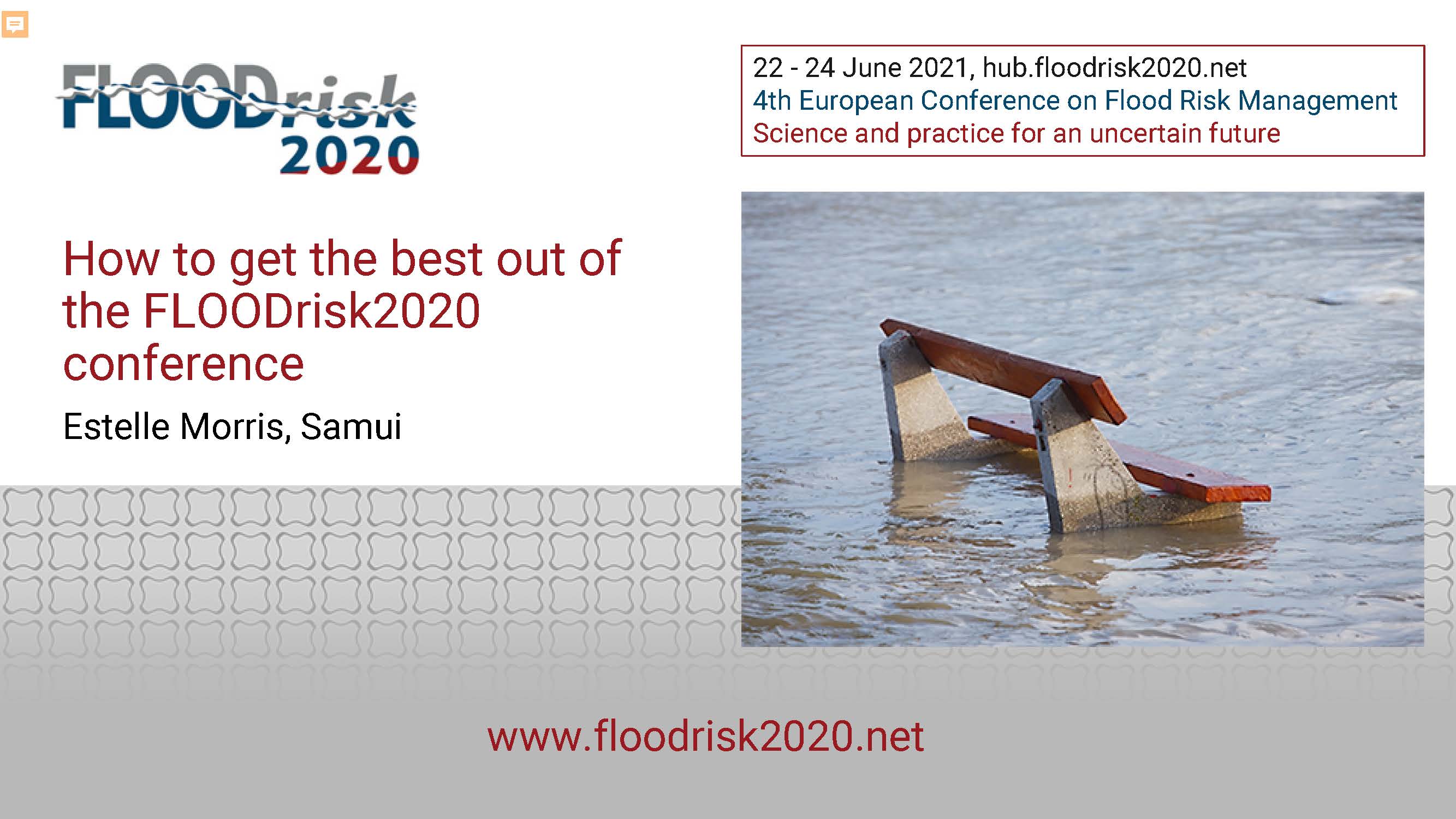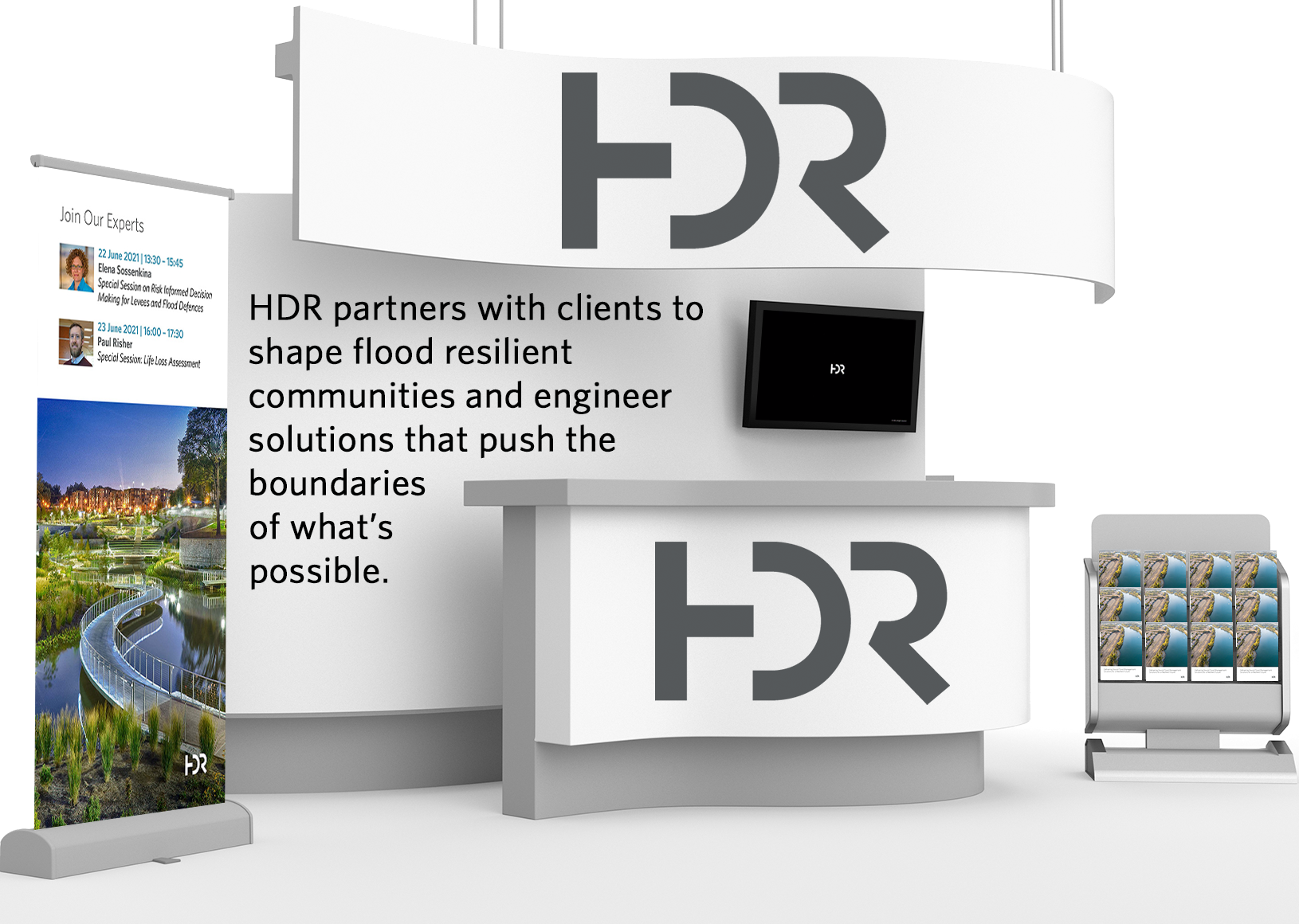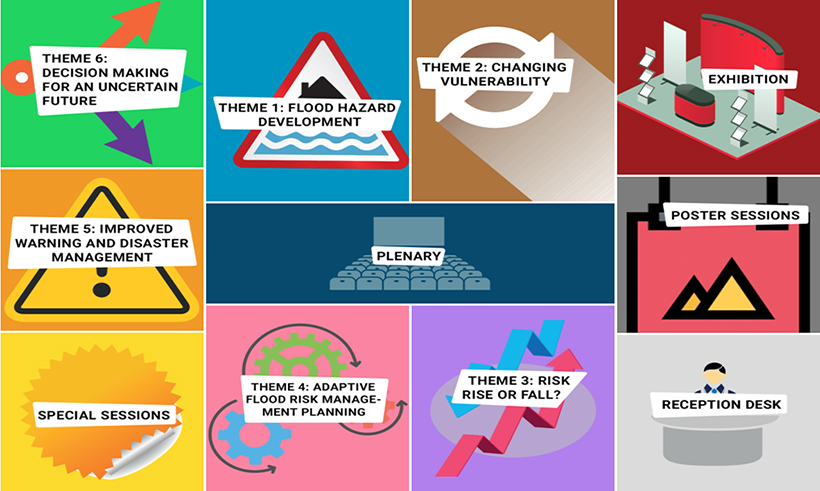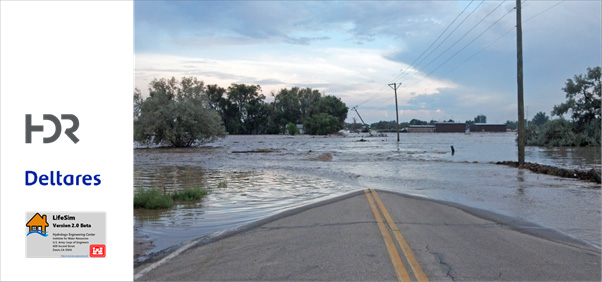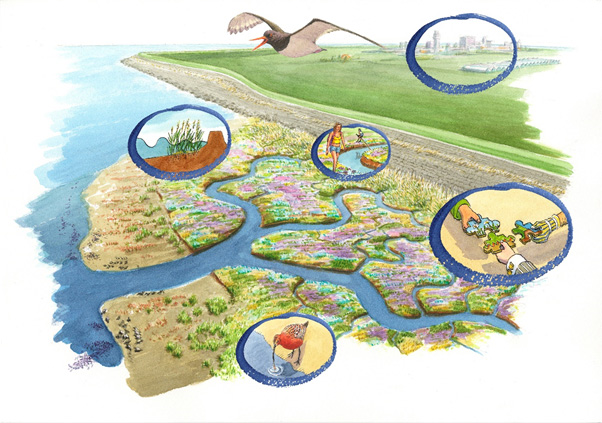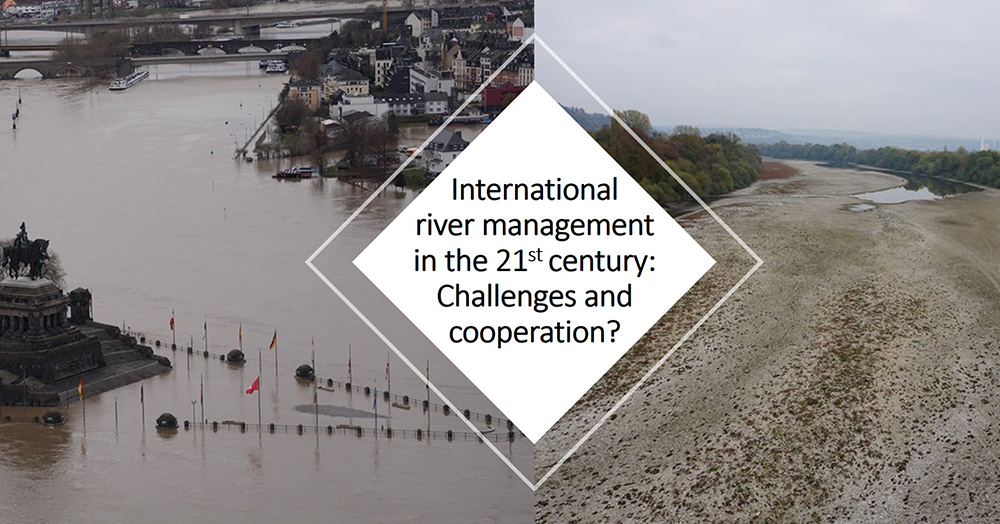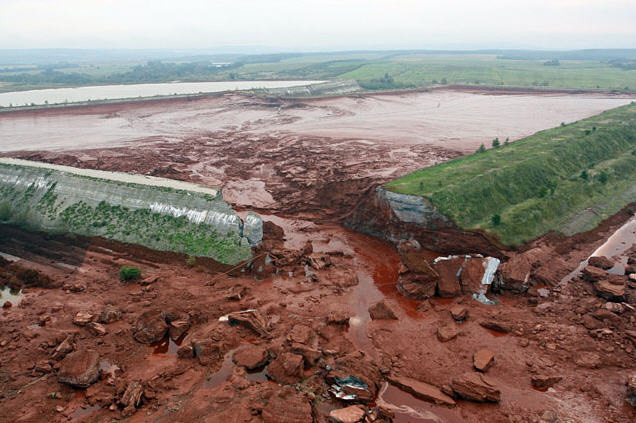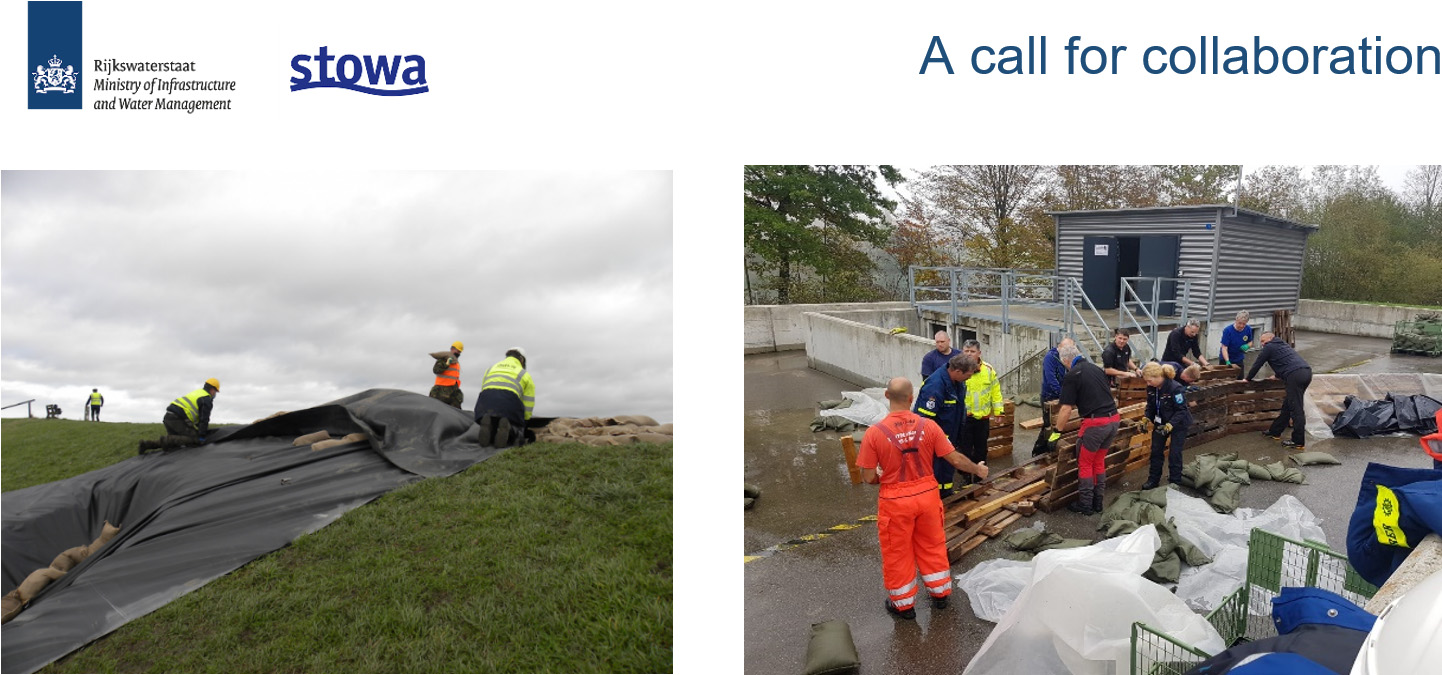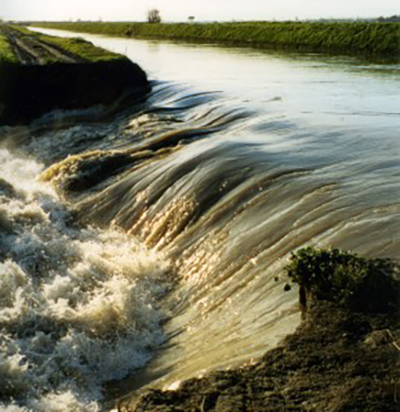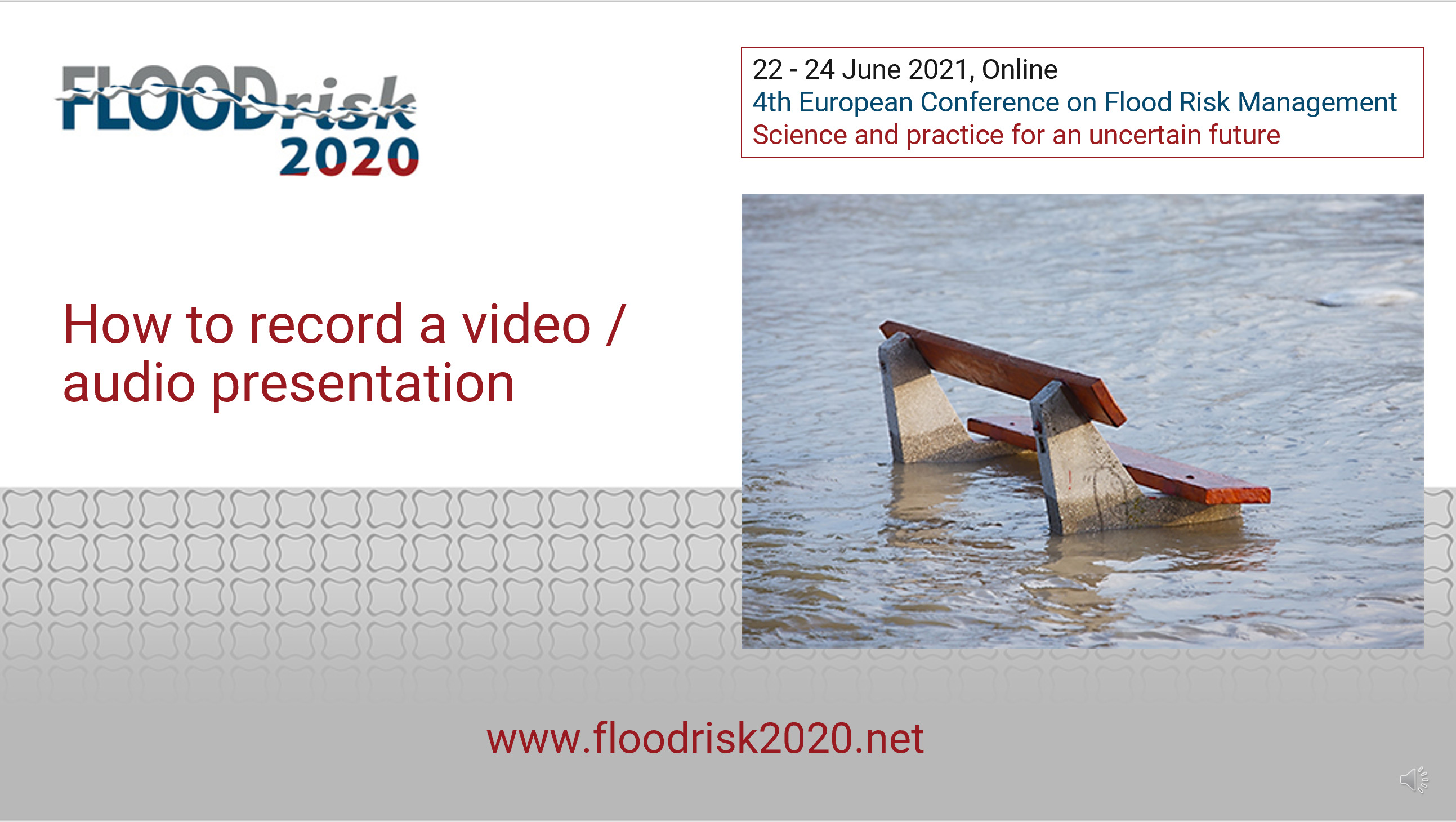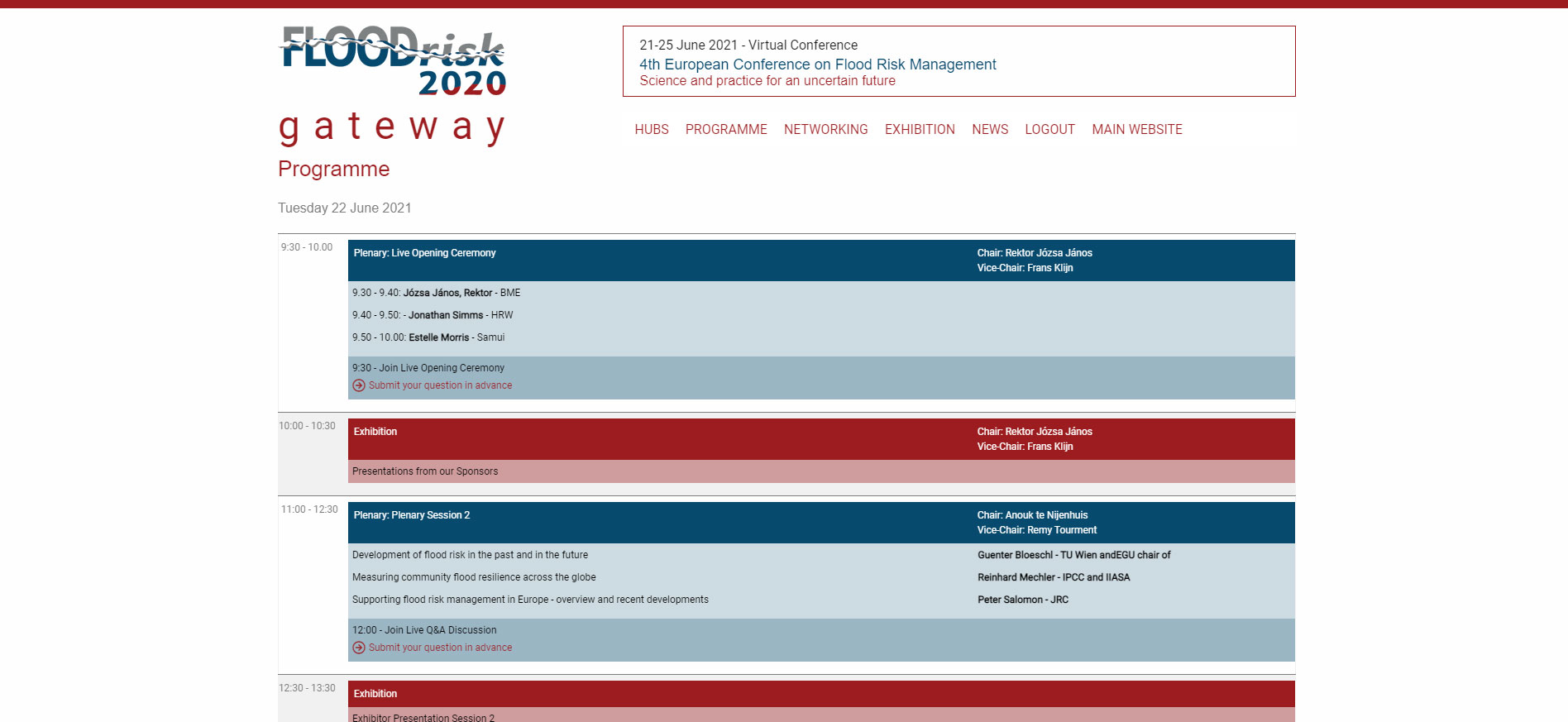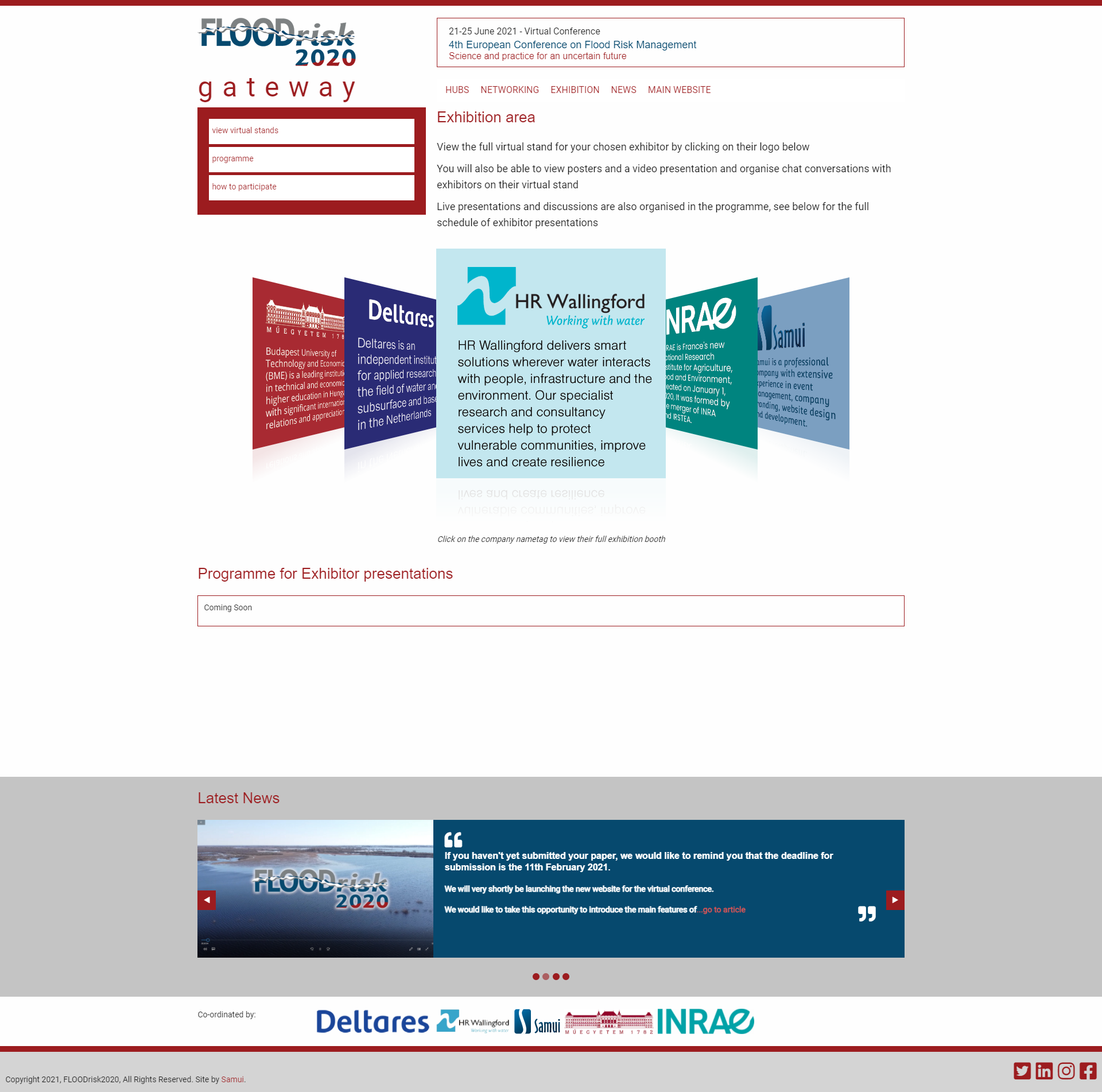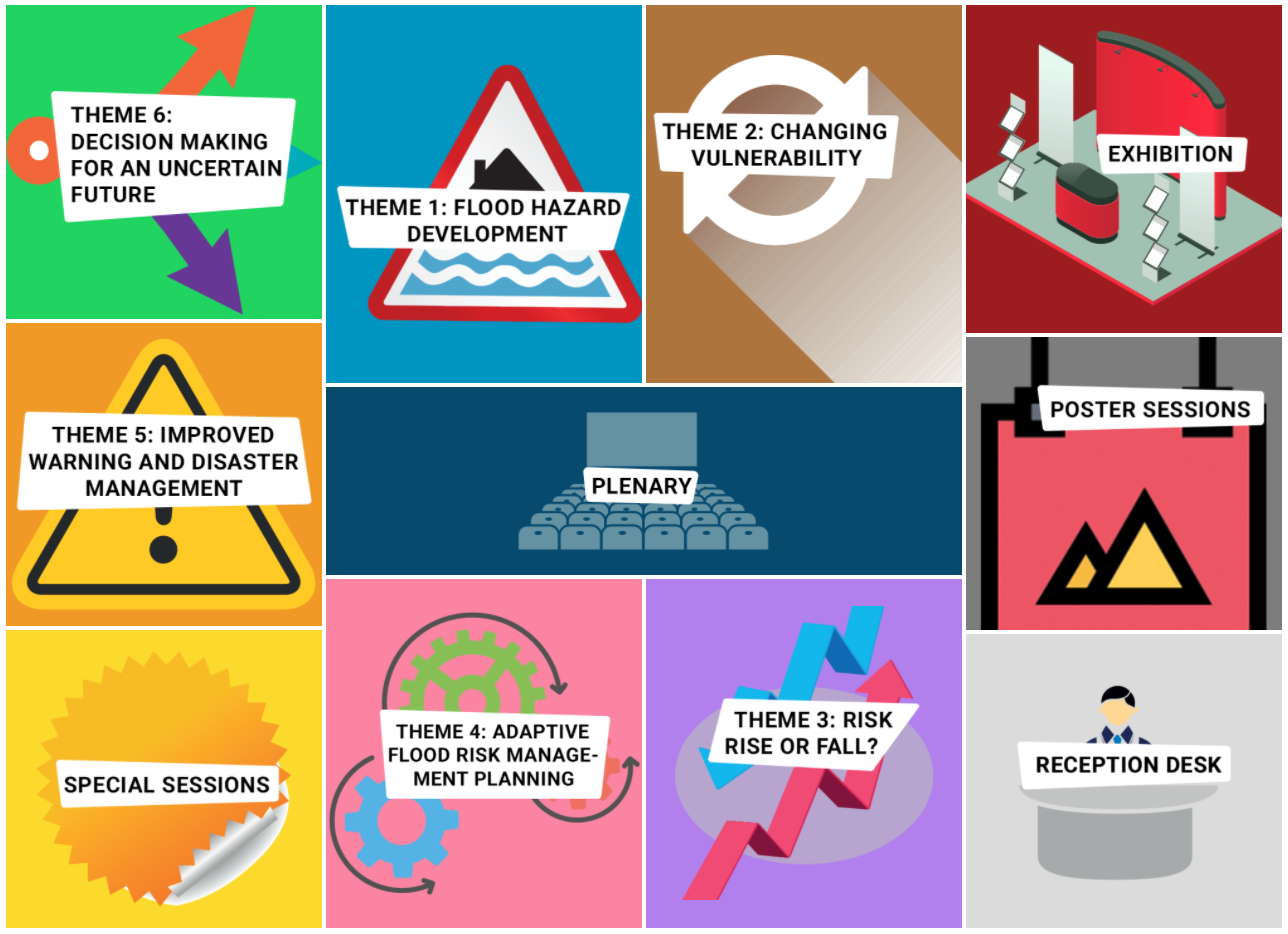My FLOODrisk 2020 Schedule
Select the sessions you wish to attend by clicking on the icon from the programme page and then view your schedule here.
Tuesday 22 June 2021
No sessions selected
Wednesday 23 June 2021
No sessions selected
Thursday 24 June 2021
No sessions selected
Latest News
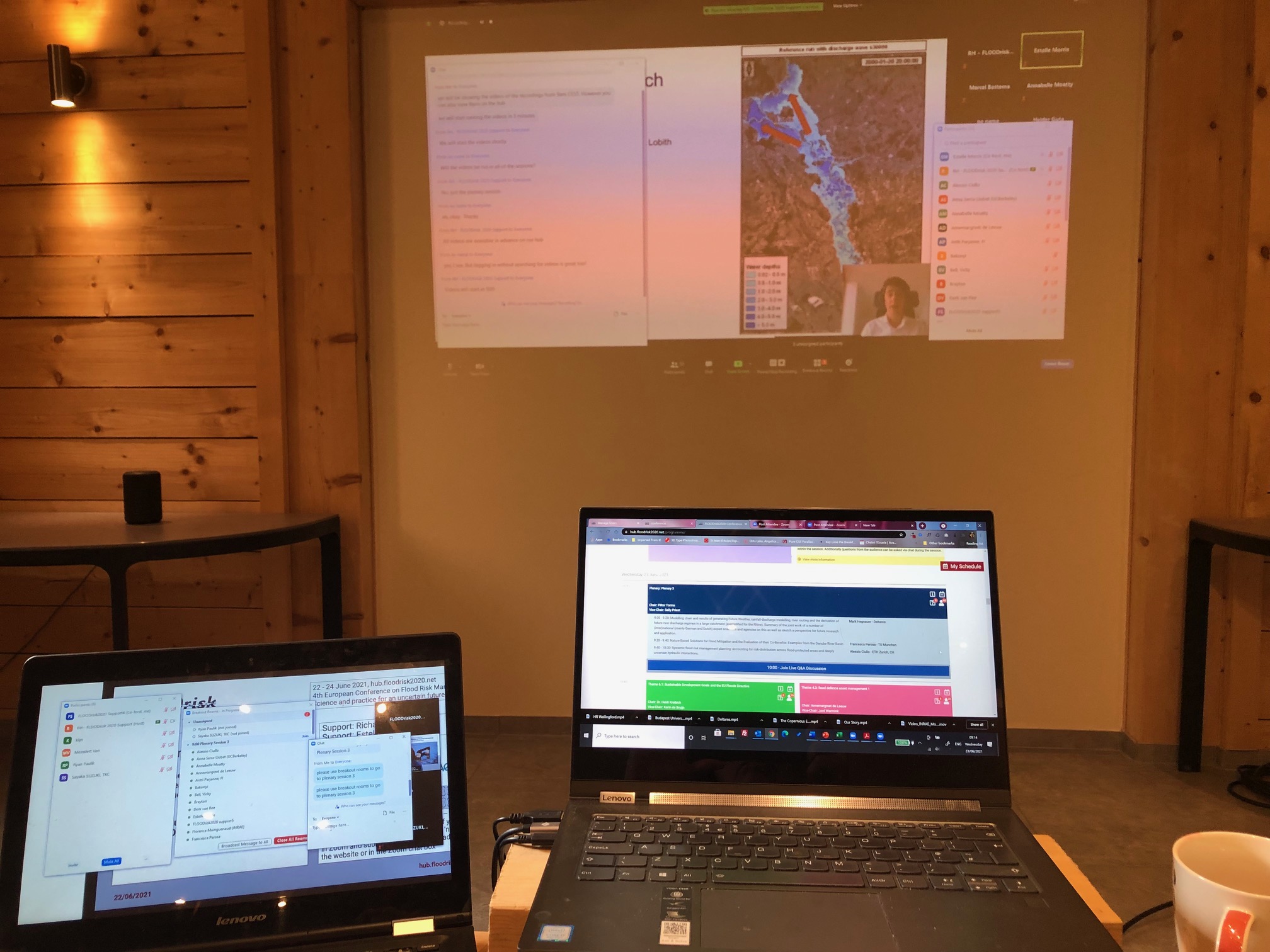
The recordings for all the FLOODrisk2020 virtual conference live sessions are now available for you to watch online on the FLOODrisk2020 hub.
To view the recordings, go to the programme page on the FLOODrisk2020 hub and click the info icon to open the full information page for the selected session, the Zoom recordings will be available for you to watch in the box at the top of the page under 'watch live session'.
This will allow all registered participants to watch the sessions that they were not able to participate in during the conference. These live recordings and all the video presentations will be available for you to watch until the end of 2021.
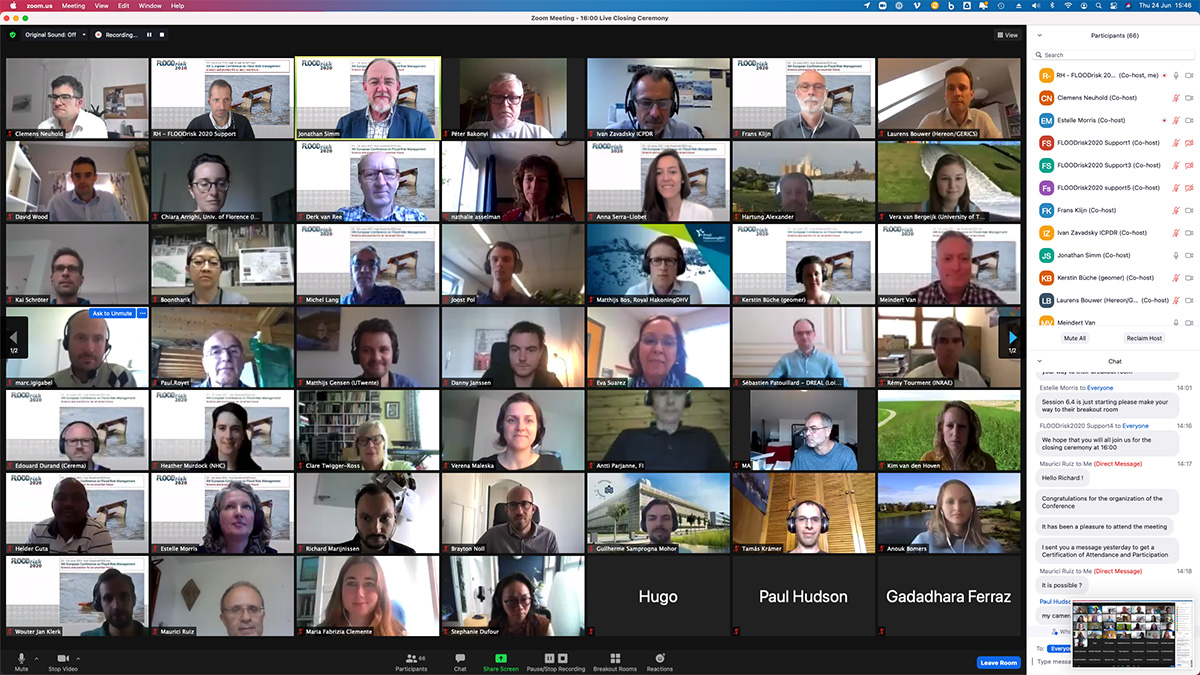
We would like to take this opportunity to thank all of you who participated in the FLOODrisk2020 virtual conference last week.
Although we would have preferred to meet all of you in person in Budapest , we hope that you enjoyed the range of presentations and discussions that were on offer. The virtual format did, at least, give us the opportunity to continue these discussions despite the current worldwide travel restrictions.
We hope that you will join us in Budapest in 2024 and we promise to keep you informed of progress in the organisation of our next in-person conference.
In the meantime, we would be grateful if you could give us your feedback for FLOODrisk2020 through this survey https://ec.europa.eu/eusurvey/runner/FLOODrisk2020. Your responses will help us plan and implement future events that are tailored to your needs and expectations.
Thank you again.
The FLOODrisk2020 Organising Team

Day one and two of the FLOODrisk2020 conference are now over and we would like to thank all our participants, speakers and chairs and co-chairs for your participation in this conference with a difference.
Tomorrow is the last day of the conference, but we still have a lot of content to cover, so please do not forget to come and join us at 9am CEST tomorrow morning.
For those of you who are made co-hosts during the conference, please do be careful NOT to close the breakout rooms. We have seen both today and yesterday that this closes them for all of us.
When you are joining tomorrow, the zoom link will be different, so please refresh your screen before clicking on a join live session link on the FLOODrisk2020 hub.
We hope that you'll continue to enjoy the conference
Please note that the Zoom links for tomorrow's FLOODrisk2020 virtual conference are now live.
Go to hub.floodrisk2020.net and select your preferred hub or the programme page and click on the link to open the zoom call.
There is still time to register to attend. To do this go to https://floodrisk2020.net/registration/ and register.
We are looking forward to welcoming you to the conference tomorrow morning at 9:30am CEST, for the live welcome ceremony.
Special Session: Interactive session on urban flood resilience - exploring the role of critical infrastructure and stakeholder engagement
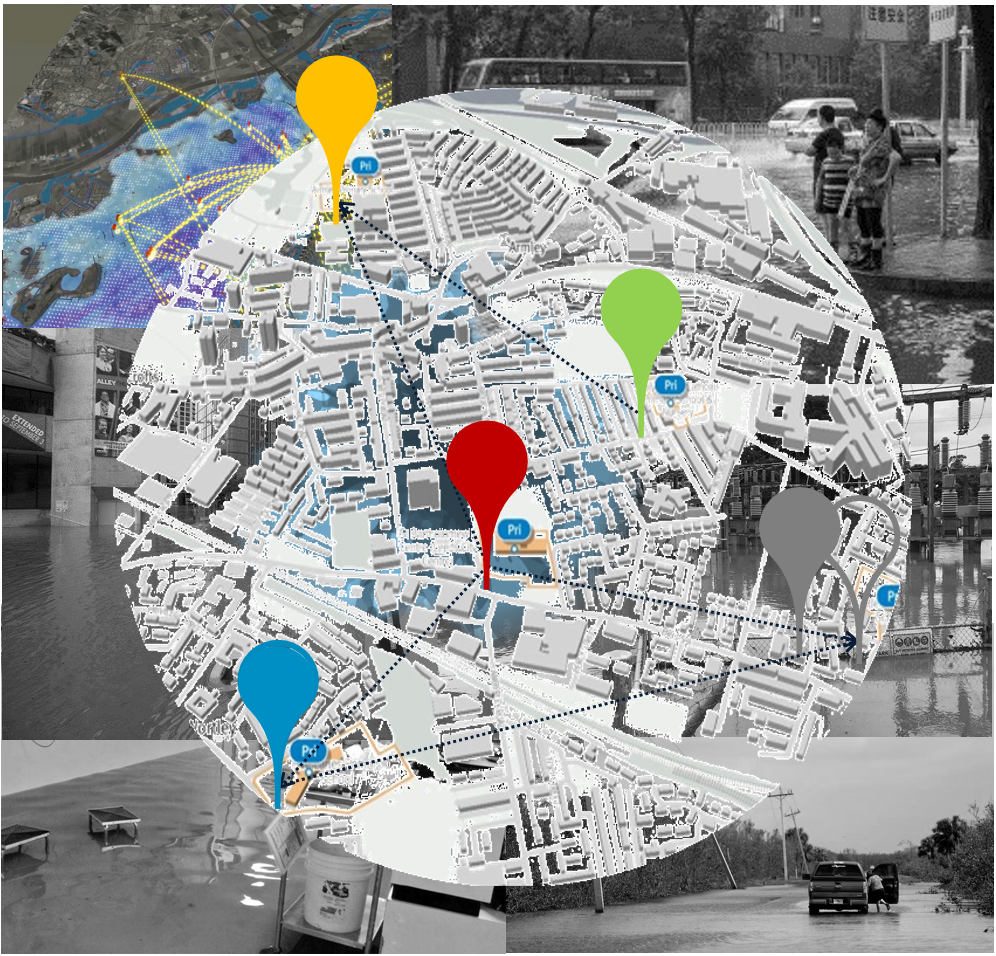
The Special Session: Interactive session on urban flood resilience - exploring the role of critical infrastructure and stakeholder engagement will take place virtually on Thursday 24 June 2021 -from13:30 to 15:00.
The session will be led by Karin de Bruijn, Heather Murdock, Shristi Vadya and Dr. Evalyna Bogdan
In this interactive session we will explore the vulnerability of urban areas to flood and the complexity of flood management in such areas. In the event of a flood, people and businesses in the urban environment often depend on the ability of the city and higher levels of government to cope. There are, however, many actors that need to be involved including not only water specialists and emergency managers but also urban planners, critical infrastructure operators, and the local community as a whole. This session will put participants in the drivers seat to examine how how damage and disruption can be reduced with consideration of the role of critical infrastructure and network effects using the Circle tool. The schedule for this workshop is as follows:
- 10 mins Introduction
- 10 mins Opening presentation (Dr. Karin de Bruijn)
- 10 mins Introduction to CIrcle (Heather Murdock & Shristi Vadya)
- 30 mins CIrcle session
- 5 mins Break
- 20 mins Group work presentations
- 10 mins CIrcle online demonstration
- 20 mins Reflection and feedback (Dr. Evalyna Bodgan)
- 5 mins Closing
We invite anyone interested in enhancing urban flood resilience to join this participatory session.
Please use the 'add to Schedule' button on the Special Session Programme, to register your interest in participating in this special session.
For more information visit the Special Session Hub and the webpage https://hub.floodrisk2020.net/theme/specials/urban-flood-resilience/.
To access this page, you will need to be registered online. If you haven't done so yet, please Register Now Here. Now is the time to do so, as the conference content is already live, enabling you to view video presentations for both oral and poster presentations.
There are now less than 6 days left till conference day. Are you registered to attend? If not you will be missing out on some groundbreaking presentations and discussions between the world leaders in FLOODrisk management, so make sure to register on floodrisk2020.net/registration/.
We have put together a 10 minutes video to help you get the best out of the FLOODrisk2020 virtual conference. You can find it here on the first plenary hub webpage.
The video explains what you can expect to find in each of the hub.floodrisk2020.net hubs and pages, how to navigate around the website and how to use the tools that we have provided for you to make your journey through the virtual conference as easy and enjoyable as possible.
Most importantly, remember that none of the presentations for the parallel sessions will be shown live. They are already accessible online and will need to be viewed ahead of the live question and answer sessions. Only the presentations for the opening ceremony plenary sessions, the closing ceremony plenary sessions and some of the special sessions will be shown live. Don't worry though, we have allocated enough time ahead of the Q&A sessions for you to view the video presentations.
All live sessions will be ran in Zoom breakout rooms. The Zoom link will be available from any of the 'join live sessions' links on the website. There will be a single Zoom link for each day of the conference. We recommend that you use the Zoom app rather the Zoom website to attend the virtual conference and that you update your Zoom app to the latest version ahead of the meeting.
In any case, we will be there to guide you and help you during the conference on Zoom (under FLOODrisk help) and you can find our contact details in the reception desk hub.
We look forward to welcoming you on Tuesday 22nd June and hope that you'll enjoy the conference in its new virtual format.
We are delighted to introduce HDR as silver sponsor to the FLOODrisk2020 virtual conference
HDR is an employee-owned design firm specializing in engineering, architecture, environmental and construction services. For more than a century, we have partnered with our clients to shape flood resilient communities and protect and sustain water resources around the world. We approach flood risk management from an integrated perspective. Using nature-based and manmade infrastructure components, our subject matter experts in hydrology, hydraulics, geotechnical and structural engineering, consequences modeling and risk informed decision making engineer flood defence solutions that push the boundaries of what is possible.
We believe that the way we work can add meaning and value to the world. That ideas inspire positive change. That coloring outside the lines can illuminate fresh perspectives. And that small details yield important realizations. Above all, we believe that collaboration is the best way forward.
Headquartered in the United States, our 10000+ employees work in over 200 locations around the world to deliver projects that build strong communities. To learn more about how we are helping our clients create resilient communities please visit hub.floodrisk2020.net/exhibition/hdr/.
Please make sure to visit our virtual stand, view the poster, view the video and download the brochure. You can also message us by using the 'Click to message' function on the right hand side.
You can visit the virtual exhibition hall even if you are not yet registered. We would like to take this opportunity though to remind you to register here to attend the conference and make the most of the features already available online.
The video presentations for the FLOODrisk2020 virtual conference are already available online on the conference gateway on hub.floodrisk2020.net for all registered participants.
There are multiple ways that you can access the presentations:
- you can go to the 'programme' page an click on the icon next to the session that you are interested in, which will open a detailed information age for this session
- in the programme page, you can also click on the icon to add the session to your schedule and then from the 'my schedule' window (accessed by clicking on the 'my window' button you can access the detailed information page by clicking on the 'View sessions details link'
- In the gateway homepage, you can select one of the Theme's hub you can view the presentations in the 'View Videos' section or by clicking on the red links in the programme section
Don't forget that you are also able to submit your questions in advance.
Note: video presentations will not be shown live in the sessions during the conference. You will need to navigate through the website to view them. However we have allocated enough time in the programme for you to view the videos, on the virtual conference website, before the Q&A sessions start.
If you have not yet registered to attend the conference, now is the time to do so to make the most of the conference. Please do so by going to the Registration page on the website.
We hope that you will enjoy the FLOODrisk2020 virtual conference in this new format and look forward to welcoming you on 22 June 2021 at 9:30 CEST (the time in Paris) for our live opening ceremony.
We are delighted to announce that the recorded videos for the conference presentations, whether oral or poster, are now available on the FLOODrisk2020 virtual conference hub.floodrisk2020.net website for registered participants to view.
If you have already registered to attend the conference, you can now make your way to hub.floodrisk2020.net, select the Theme that you are interested in, and select the video that you wish to view from the 'View Videos' section or by clicking on the red links in the programme section. This will load a popup-box enabling you to view the video and download the presentation and paper if they have been provided.
Note that the titles not in red are those for which we have not yet received a video presentation. Videos will be uploaded as and when they are supplied to us, so please come back to the website, regularly between now and the conference start on 22nd June, to view the video presentations.
In the popup boxes, underneath each video and below the programme section in each Theme hub, you will also be able to submit questions for the presentations that you have viewed, ahead of the conference and the Question and Answer sessions that will take place live from 22nd to 24th June. We would be grateful if you could do this, as it would greatly help us in organising those live Q&A sessions. The session chair will then be able to ask those questions for you if you are not able to attend in person or if too many people raise their hands to speak.
Note: video presentations will not be shown live in the sessions during the conference. You will need to navigate through the website to view them. However we have allocated enough time in the programme for you to view the videos, on the virtual conference website, before the Q&A sessions start.
The videos will be available to view for all registered participants, from today, all the way through the conference and after the conference, giving you plenty of time to view the content of the conference at your leisure. The Q&A sessions will also be recorded and posted to the website, once they are completed, giving you the opportunity to view the discussions that took place during the conference, even if you were not able to participate in those Q&A sessions, making it even more important for you to view the videos and submit your questions in advance.
If you have not yet registered to attend the conference, now is the time to do so to make the most of the conference. Please do so by going to the Registration page on the website.
We hope that you will enjoy the FLOODrisk2020 virtual conference in this new format and look forward to welcoming you on 22 June 2021 at 9:30 CEST (the time in Paris) for our live opening ceremony.
The Special Session: Life Loss Assessment Models and Methods will take place virtually on Wednesday 23 June 2021 from 16:00 to 17:30. Note the timing has changed from 11:00 to accommodate our participants who will be joining the session from the USA.
The session will be led by Karin de Bruijn, Jason Needham, Woodrow Fields, and Paul Risher
This special session will cover the uses of flood fatality models around the world. In some countries, flood risk management laws require quantification of flood fatalities to understand flood risk. Some countries have policy that supports flood fatality modeling, and others are mute on the subject. We’ll discuss how the results of a flood fatality model can inform flood risk management decisions by providing a better understanding of flood risk.
The team will review essential elements of all flood fatality models and survey some of the most frequently used models and methods from around the globe. The scale of model resolution, theoretical basis, and source of empirical data underlying these methods make them useful for different applications. Historical data is important for model validation, but scarce. A few sources of historical information and opportunities to contribute will be discussed.
The US Army Corps of Engineers, developers of LifeSim, will demonstrate their software and discuss its application on a historical dam breach flood. They will show how to load and manipulate input data, run a Monte Carlo evacuation simulation with consideration of uncertainty, and visualize output in maps and figures. Participants can follow along by downloading the software at: HEC-LifeSim Downloads (army.mil).
Finally, there will be time for the audience to participate in the discussion and ask questions of the panel.
The programme of this special session will include
16:00 Purpose and overview
- Standard elements of flood fatality models
- Application of life loss modeling for flood risk assessments
- Informing flood risk management through life loss modeling
16:10 International flood risk policy
- Survey of laws and policy requiring or benefitting from flood fatality models
16:15 Methods and models
- Review and compare frequently used flood fatality models and methods
- Model application and preferred usage
- Historic validation data – databases of flood fatalities
16.35 LifeSim v 2.0 demonstration
- Review a dam failure case history
- Build and run a HEC-LifeSim model of the historic flood
- Visualize typical model output and results
17:05 Audience participation, questions and answers with session leaders.
- Standard models
17:30 Closing
Please use the 'add to Schedule' button on the Special Session Programme, to register your interest in participating in this special session.
For more information visit the Special Session Hub and the webpage https://hub.floodrisk2020.net/theme/specials/lifeloss/.
To access this page, you will need to be registered online. If you haven't done so yet, please Register Now Here. Now is the time to do so, as the conference content is already live, enabling you to view video presentations for both oral and poster presentations.
Special Session: What is the future of communities’ and citizens’ “active involvement” in the delivery FCERM to support proactive resilience? What are the challenge and opportunities for research?

The special session What is the future of communities’ and citizens’ “active involvement” in the delivery FCERM to support proactive resilience? What are the challenge and opportunities for research? will take place virtually on Thursday 24 June 2021 from 13:30 to 15:00.
The session will be led by Dr Clare Twigger-Ross, Dr Simon McCarthy, Dr Jonathan Simm, Paula Orr and Rolands Sadauskis
There is much discussion around the involvement citizens and communities in the delivery of flood resilience. There is some consensus that for flood risk management to be resilient it needs to focus on all aspects of resilience: resistance, adaptation and transformation. In so doing diversity in flood risk management strategies becomes more important bringing with it multi-stakeholder and multi-level governance. Involving communities and citizens in the delivery of FCERM becomes central as flood risk is played out at the local level. This interactive session draws on recent review work (Twigger-Ross et al, 2021 see link below) from England looking at the role of citizens and communities in flood and coastal erosion risk management activities, specifically in terms of managing uncertainty and future risks through adaptation and transformation (proactive resilience). Whilst there is a clear pull in terms of legitimacy, normative and instrumental objectives for the increased involvement of communities and citizens in the delivery of FCERM, there are also clear challenges: what does multi-stakeholder working look like in practice? Who gets heard? What evidence do we have that it increases resilience? How does the local link up with the national? What are the impacts on those flood affected citizens who do get involved? Given that the focus of the evidence is on the UK this session will be an opportunity to compare and contrast evidence and experiences from around the world.
The programme of this special session will include:
13.30 Introductions: Participants to enter in chat function their name, organisation, country, topics of interest
13.35 Current and possible futures for communities and citizens Presentation (Dr. Clare Twigger-Ross, CEP) Dr Twigger-Ross will present from research carried out for the Environment Agency (England) as part of the development of the Communities and FCERM Research and Development Framework which was published in April 2021. She will present an overview of the work focussing on the three aims of the framework and the gaps identified within the areas of literature reviewed and the proposed areas for research specifically with a focus on proactive resilience – adaptation and transformation together with some key questions for the future of involvement. (20 mins)
13.55 Discussion in small groups: (the participants will be divided into small groups of 6 – 8 to discuss the following questions –each group will have a facilitator to aid the discussion and the Jamboard will be used to enable people to put up their views. The questions will be the following:
- How does what you have heard match with your understanding of the evidence?
- What do you see as the most important issues for research in this area?
- What do you see as the challenges for research in this area?
- Where are there the opportunities?
The discussion in small groups will be for 20 minutes. This will be followed by a plenary session of 15 minutes to hear from each of the groups and to bring the ideas together.
14.25 Challenge Panel and discussion on Communities’ and citizens’ involvement challenges and Opportunities – Where next? – Key experts from different perspectives in FCERM (regulatory, academic, operational, and communities) including Prof Lindsay McEwen. Each expert will be given 5 minutes to make their points and then there will be a chance for discussion. The session will last 40 minutes.
15.00 Round up and final points (5 minutes)
Before the session participants are encouraged to look at the publications from the research which can be found here: https://www.gov.uk/flood-and-coastal-erosion-risk-management-research-reports/flood-and-coastal-erosion-risk-management-research-and-development-framework-working-with-communities
Please use the 'add to Schedule' button on the Special Session Programme, to register your interest in participating in this special session.
For more information visit the Special Session Hub and the webpage https://hub.floodrisk2020.net/theme/specials/role-of-communities/.
To access this page, you will need to be registered online. If you haven't done so yet, please Register Now Here.
The special session ‘Love and hate’ relationship between Flood Risk Management and Natura2000!? will take place virtually on Wednesday 23 June 2021 from 16:00 to 17:30.
The session will be led by Harm Rinkel, Stephanie Janssen & Ellen Tromp
Across Europe countries are taking measures to reduce flood risk through dike reinforcement projects as part of the EU Water Framework Directive. On many locations, both in river and coastal areas, dike reinforcement efforts border or overlap Natura2000 areas. In the current situation dike managers experience difficulties and hurdles around the Natura2000 legislation. Different approaches and strategies are being developed to overcome these perceived challenges. Such approaches include strategies of complete avoidance of Natura2000 areas through a sole focus on dike structure as well as complete nature-inclusive flood risk reduction strategies.
In the special session on the ‘love and hate’ relationship between flood risk management and Natura2000 will be explored. We will discuss the scale and occurrence of the relationship and identify the challenges and opportunities it may offer. Different approaches to deal with Natura2000 in flood risk reduction are being showcased in case studies from different countries. Successful approaches will help safeguarding both threatened species and habitats as well as the inhabitants from flooding!
The Programme includes:
16:00 Opening and introduction
Setting the scene by David van Raalte director at Waterschap Drents Overijsselse Delta
Interaction with participants
16:20 Case study presentations & Discussions
Netherlands – a combined approach by Esther Dieker (Arcadis)
Dikes are located close to nature areas and both need improvement. Until recently nature restoration and dike improvements were considered in isolation from each other, despite the obvious connections. Dike improvements and nature restorations can benefit from a combined approach. In the presentation experiences are shown from two Dutch projects where this was done: the Lauwersmeer dike improvement project and the Water Framework Directive project for improvement of river forelands in the East of the Netherlands.
Germany – Saxony-Anhalt by Sven Schulz (Ministry of Environment, Agriculture and Energy) and Thilo Weichel (State Agency for Flood Defence and Water Management of Saxony-Anhalt)
Saxony-Anhalt with more than 300km Elbe river is characterised of a high degree of lost of potential flood areas in the past. The extreme flood events in 2002 and 2013 with new records water levels clarified that rivers need their space. Based on this fact the programme “More space for rivers” was published in Saxony-Anhalt. Here a lot of projects are planning or already realized.
17:00 Group work – sharing experiences and best practices in combining Flood Risk Management and Natura2000
17:20 Session closure and next steps
Please use the 'add to Schedule' button on the Special Session Programme, to register your interest in participating in this special session.
For more information visit the Special Session Hub and the webpage https://hub.floodrisk2020.net/theme/specials/natura2000/.
To access this page, you will need to be registered online. If you haven't done so yet, please Register Now Here.
The special session ‘International river management in the 21st century: challenges and cooperation?’ will take place virtually on Tuesday 22 June 2021 from 16:00 to 17:30.
The session will be lead by Adrian Schmid-Breton and Jan Kruijshoop, International Commission for the Protection of the Rhine (ICPR)
What are the water management challenges facing (international) basins and what can they do to meet them? What can (international) river basins do to prepare and adapt to future changes?
Organised and moderated by the International Commission for the Protection of the Rhine, the oldest international environmental river commission in the world, and accompanied by other river basin organisations from all over Europe this session address the issue of preparing (international) river basins for the effects of socio-economic and climatic changes, with consequences on discharge (floods, low water & droughts), the use of the water and water availability. To answer these challenges a strong cooperation within river basins is fundamental. Collaboration between river basins themselves could be also highly beneficial. The session goes beyond solely managing flood risks.
Leading question
“How can international river basin managers prepare for the future -in an integrated way-, in respect of mitigating or adapting the effects of socio-economic and climatic changes, with consequences on discharge (floods, low water & droughts), the use of the water and water availability?”
Sub-issues and particular questions addressed to the participants
- What aspects of basin/water resource management will be impacted by socio-economic and climate change? How will this affect governance and management practices? Are there potential conflicts in sight? How can they be prevented or resolved? What is the added value of international river cooperation to answer these challenges?
- How are international river basin organizations preparing themselves for these trends (good practice, projects, programs, …)? How are scenarios set up? Are there any examples of approaches combining/integrating the topics of flood, low water and drought?
- When it comes to water scarcity/drought/low water, which impacts and potential issues need to be addressed? How can they be valued and thus prioritized? Which challenges does this pose from a stakeholder and governance point of view?
- Is there interest in continuing the exchange or cooperation between participants (river management actors in a broad sense, basin organisations and international institutions) after FLOODrisk? For example, would you be interested in meeting (virtually) informally in the near future to continue our exchanges and to discuss the news and challenges of the basins/regions concerned? Should we start a joint program initiative, e.g. based on EU (Horizon2020, Green Deal, et cetera) or national initiatives?
Outcomes:
- For everyone to exchange and get mutual answers, information, experiences on the lead and sub-issues questions as well as confront ideas with others. By this means also get the right contacts for further exchanges.
- Input to the ICPR for the implementation of the Rhine 2040 programme.
- In the end, explore possibilities for future cooperation between the participants. The discussion could show that we would like to do something in common in the future (further exchanges, EU programmes, joint initiative etc.).
The programme will include:
90 minutes, web hosted meeting
- Introduction of the ICPR’s RHINE 2040 program and implementation pathways (20 minutes) (ICPR representative)
- Round table and Q/A with representatives of (international) rivers in Europe and international organisations on the "leading question", the "sub-issues" (see above) and eventually questions from the public sent prior or in the session (40 minutes)
- Additional questions and discussions from/with the public/participants (20 minutes)
- Conclusion by ICPR on common approaches, differences, lessons learnt for future tasks as well as cooperation/exchange possibilities (eventually, planning a follow-up of FLOODrisk) (10 minutes)
Please use the 'add to Schedule' button on the Special Session Programme, to register your interest in participating in this special session.
For more information visit the Special Session Hub and the webpage https://hub.floodrisk2020.net/theme/specials/rhine2040/.
To access this page, you will need to be registered online. If you haven't done so yet, please Register Now Here.
The special session ‘Preparedness and response activities in the Danube Region’ will take place virtually on Tuesday 22 June 2021 from 13:30 to 15:00.
The session will be led by Laszlo Balatonyi and Gheorghe Constantin
The Preparedness and response activities in the Danube Region session aims at introducing the EU Strategy for the Danube Region (EUSDR) Environmental Risks Priority Area (PA5) and its Disaster Management Working Group (DM-WG). The focus will be tailored to preparedness and response activities, with special focus on Tailings Management and related initiatives of the International Commission for the Protection of the Danube River (ICPDR) Accidental Pollution Control Expert Group (APC EG). The session will be concluded by sharing the latest information about possible funding instruments to achieve better preparedness and more effective response in the region.
- Introduction: of the EU Strategy for the Danube Region, Environmental Risks Priority Area (05) Dr. László Balatonyi / Gheorghe Constantin
- Challenges in the Danube Region –
- Strategic partnership in the Danube Region: EUSDR PA5 – Dr. László Balatonyi
- Preparedness and response:
- Remote sensing, as one of the potential technologies (Dr. Tibor Bíró, NUPS)
- Case study of a tailing management facility disaster - consequences and overall effect on the Hungarian disaster response system (Kolontár, HU) tbc
- The EUSDR PA5 Disaster Management Working Group – Zsolt Kelemen
- Ongoing projects and funds related to Preparedness and response activities – Kinga Perge
- Activities of ICPDR APC EG
- Tailing Management in the Danube Region – Ádám Kovács
Please use the 'add to Schedule' button on the Special Session Programme, to register your interest in participating in this special session.
For more information visit the Special Session Hub and the webpage https://hub.floodrisk2020.net/theme/specials/danube-region/.
To access this page, you will need to be registered online. If you haven't done so yet, please Register Now Here.
The special session ‘An International Handbook for Emergency Response to Flood Risk - A call for collaboration’ will take place virtually on Wednesday 23 June 2021 from 16:00 to 17:30.
The session will be led by Wout de Vries and Ludolph Wentholt
Flood emergency response is an essential component of a flood risk strategy. Effective flood emergency response depends on implementing the appropriate measures, and on executing them correctly. The skills and expertise of emergency management teams play an important role in this response. It is crucial that all involved work along commonly agreed lines. To achieve this, an initiative is launched to arrive at an International Handbook for Emergency Response to Flood Risk. This handbook will provide good practices and will share lessons learnt from floods all over the world. Furthermore, the handbook will provide “commonly agreed lines” of emergency response. In this way, it will be an invaluable tool to train staff in the operation of flood fighting. In addition, it can be a very valuable tool for streamlining international assistance in real flood events.
This special session is an open invitation to join us in a coalition of the willing to arrive at the International Handbook for Emergency Response to Flood Risk. It can also be seen as a stepping stone towards the International Community of Practice of Flood Fighters.
The programme of this special session will include
16:00 Introductions - Participants to enter in chat function their name, organisation, country, topics of interest
16.10 Interactive introduction, including topics Why a Handbook, Experience so far, Initial thoughts on the table of contents, Target audience, Expected outcome.
16:35 Practical aspects (interactive): How to arrive at a coalition, Position and future use of the Handbook, Proposed way of working, Roadmap to kickoff, other items to be considered.
17:00 Further discussion
17:30 Closure
The hoped-for outcome of this session is to establish a community of experts who will work together on this Handbook.
Please use the 'add to Schedule' button on the Special Session Programme, to register your interest in participating in this special session.
For more information visit the Special Session Hub and the webpage hub.floodrisk2020.net/theme/specials/international-handbook/.
To access this page, you will need to be registered online. If you haven't done so yet, please Register Now Here.
We are pleased to welcome Copernicus Emergency Management Service as exhibitors to the FLOODrisk2020 virtual conference.
Copernicus Emergency Management Service provides mapping products based on satellite imagery as well as wildfires, flood and drought early warning products.
You can find their virtual exhibition stand on the FLOODrisk2020 Gateway on hub.floodrisk2020.net/exhibition/copernicus-emergency-management-service/. Please make sure to visit their virtual stand, view the poster, view the video and download their brochure. You will also be able to message them during the conference by using the 'Click to message' function on the right hand side.
You can visit the virtual exhibition hall even if you are not yet registered. We would like to take this opportunity though to remind you to register here to attend the conference and make the most of the features already available online.
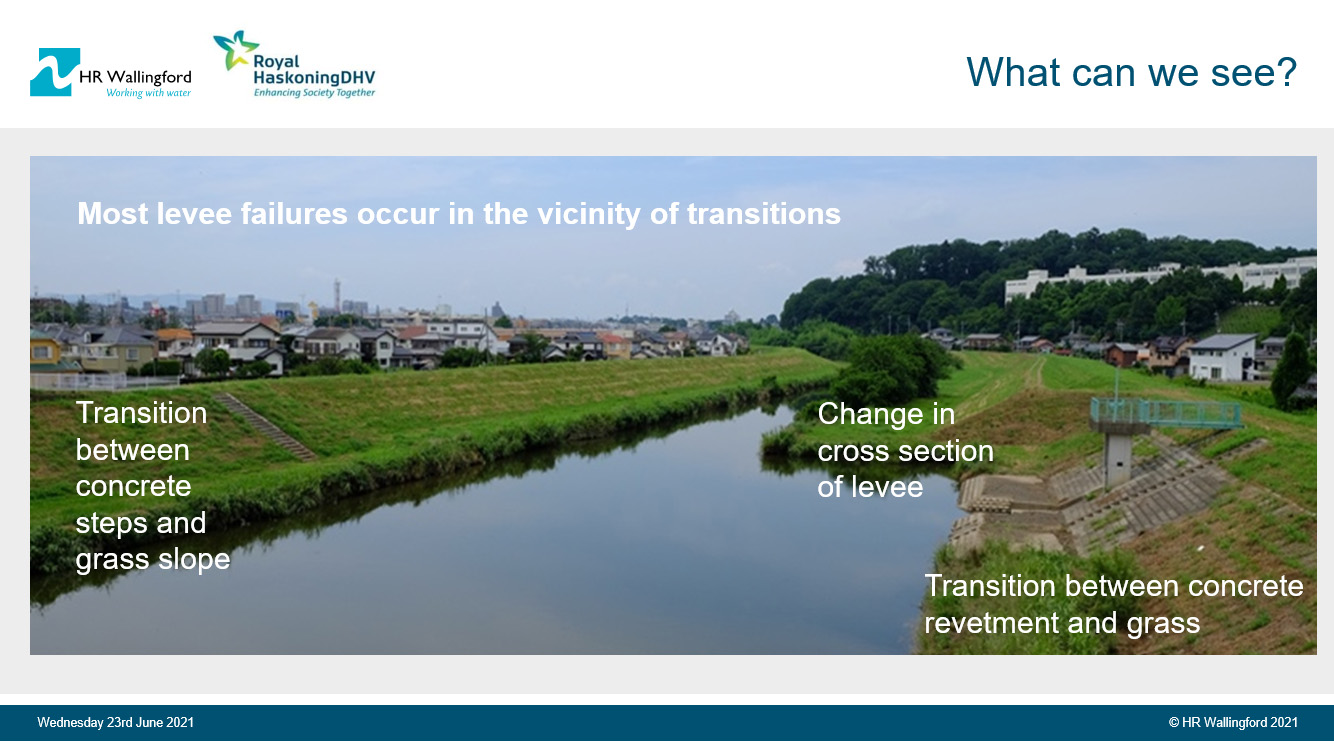
The special session 'Understanding and Managing Transitions in Levees and Flood Defences' will take place virtually on Thursday 24 June 2021 from 11:00 to 12:30.
The session will be led by Jonathan Simm, Jaap Flikweert and Matt Arthur
Transitions between levees (earthen flood embankments) and other hard structures are areas of weakness within an overall system of flood defences and can be found at any location, on or within a flood defence where there is a change in flood defence structure or of protection revetment (slope or crest, road, etc.), in an internal cross section and in the construction or foundation materials. The transition typically promotes the processes of internal and external erosion. If these processes are undetected, or left unchecked, they can ultimately lead to flood defence failure and breach. This special session outlines the results of UK research on the inspection, performance assessment and management of transitions. There will be plenty of time for discussion to explore experiences of attendees related to transitions, to compare different approaches in Europe and elsewhere to their assessment and management and to identify future research needs.
The programme of this special session will include:
11:00 Introductions - Participants to enter in chat function their name, organisation, country, topics of interest
11:05 Introduction (1): the context and drivers for considering transitions (Matthew Arthur, EA)
11:15 Introduction (2): Transitions failure mechanisms, reliability analysis and sensitivity analysis (Jonathan Simm
11:30 Introduction (3): Inspection, assessment and remediation of levee transitions (Jaap Flikweert)
11:45 Plenary discussion on experiences with transitions: challenges, solutions, outcomes
11:55 Break out group discussions on three topics:
- Examples/case studies of issues/solutions with transitions.
- Management processes around transitions, including
- Inspection/survey/data capture
- Prioritisation of transitions for attention, including any assessment of reliability/probability of failure
- Remediation
- Possible future research areas for transitions.
12:15 Feedback from breakout groups
12:25 Concluding remarks
12:30 Close of session
Please use the 'add to Schedule' button on the Special Session Programme, to register your interest in participating in this special session.
For more information visit the Special Session Hub and the webpage hub.floodrisk2020.net/theme/specials/levee-transition/.
To access this page, you will need to be registered online. If you haven't done so yet, please Register Now Here.

We would like to remind those who haven't done so already that you have until the 1st June 2021 to submit your video for the FLOODrisk2021 virtual conference.
You can find instructions on how to record a video or audio presentation and upload it to the web gateway in this video. If you need a background for your video, you can download the FLOODrisk2020 virtual conference background here.
As most video presentations will be quite large, we are requesting that the files are sent via any secure file transfer program, such as WeTransfer, to info@floodrisk2020.net.
You will find more information on how to participate here.
We would like to take this opportunity to remind you to register here to attend the conference, present your paper or poster and make the most of the features already available online.
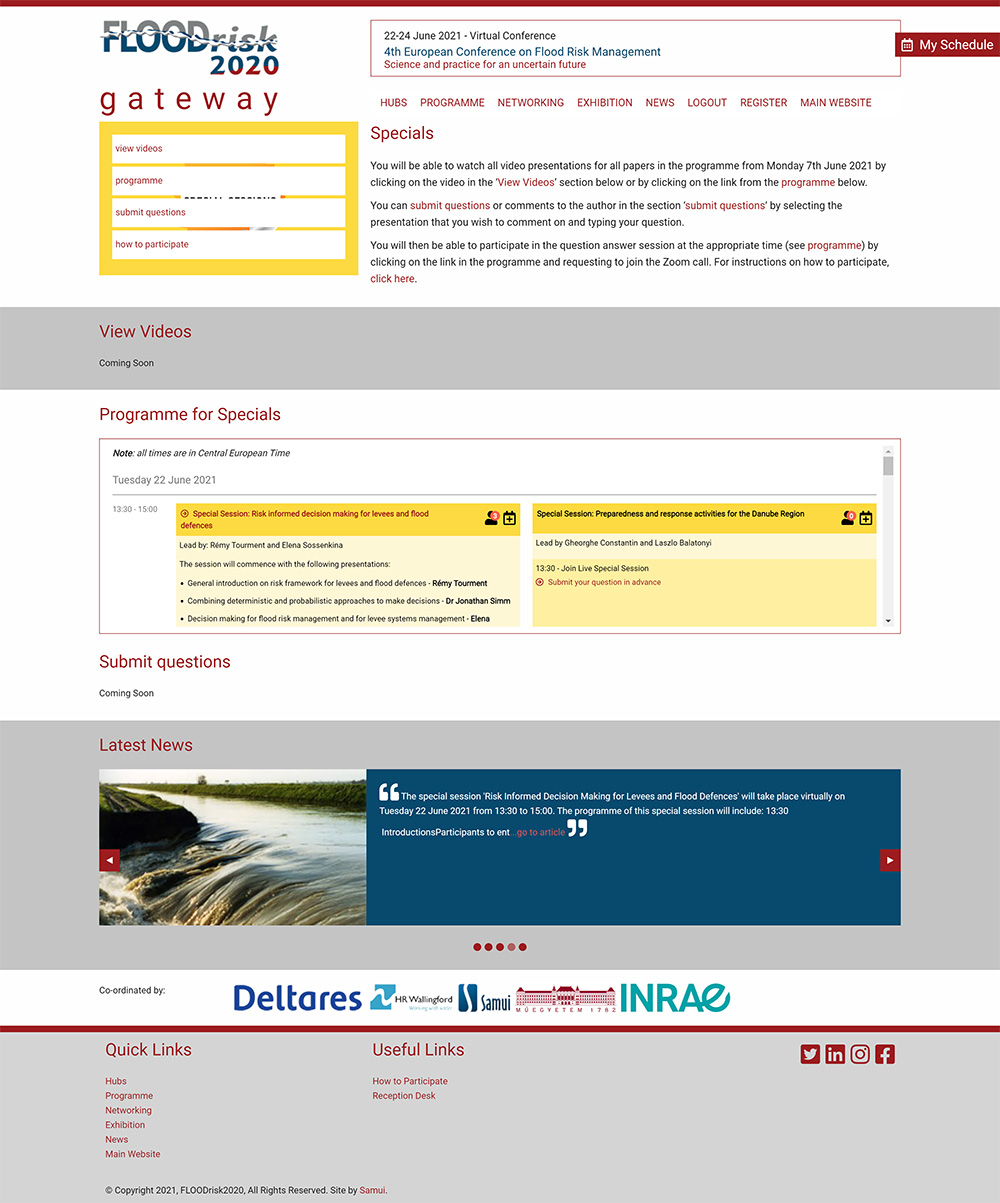
You can now add the sessions that you wish to attend to your own personal schedule on the FLOODrisk2020 virtual conference conference.
Once you are registered, login on one of the HUBS on the FLOODrisk2020 Virtual Conference Gateway and click on the icon next to the session that you wish to attend to add it to your schedule. You will see a 'My FLOODrisk 2020 Schedule' window appear on the right hand side, showing all of the sessions that you have selected. From this window, you can 'Click to download your schedule to your working calendar'.
If you wish to remove a session from your schedule, you can either click on the icon on the HUB programme, or clicking on the icon next to the session that you wish to remove in the 'My FLOODrisk 2020 Schedule' window
If you are a presenter, don't forget that you have until the 1st June to submit your video or audio presentation.
If you have not yet registered, you can do so by clicking on the Register link.
We are pleased to welcome ICOLD-CIGB Marseille 2021 as exhibitors to the FLOODrisk2020 virtual conference.
ICOLD-CIGB Marseille 2021 will be held from November 12-19, 2021 in the city of Marseille in France. This event is organized by the French Committee on Large Dams (CFBR) on behalf of ICOLD.
You can find their virtual exhibition stand on the FLOODrisk2020 Gateway on https://hub.floodrisk2020.net/exhibition/icold-cigb-marseille-2021/. Please make sure to visit their virtual stand, view the poster, view the video and download their brochure. You will also be able to message them during the conference by using the 'Click to message' function on the right hand side.
You can visit the virtual exhibition hall even if you are not yet registered. We would like to take this opportunity though to remind you to register here to attend the conference and make the most of the features already available online.
Special session: LAND4FLOOD: Coping with the challenges of using private land for flood water storage
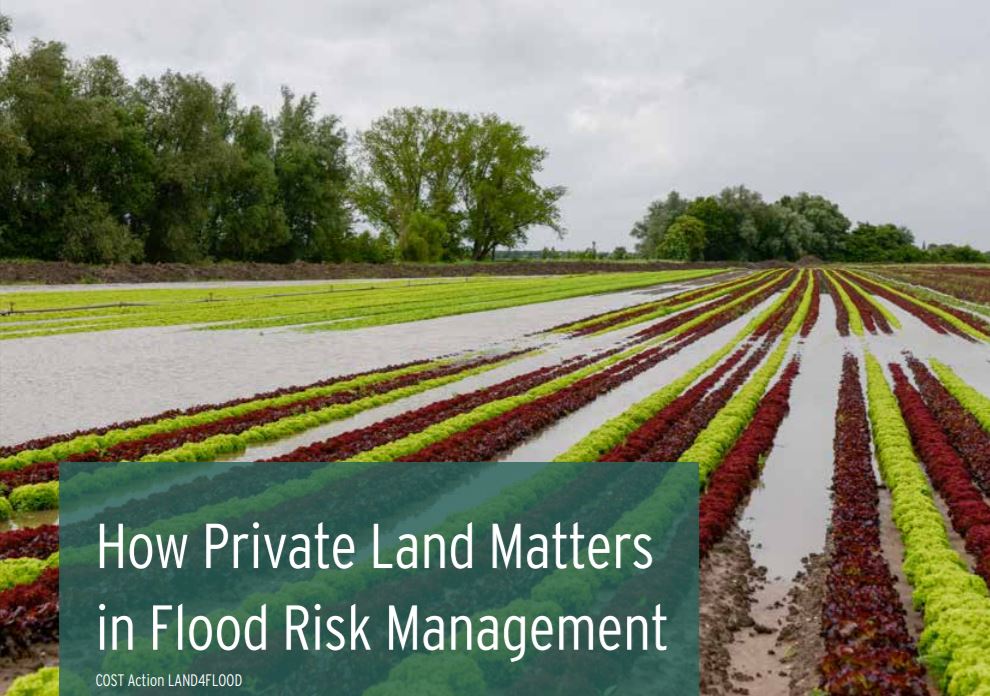
The special session 'LAND4FLOOD: Coping with the challenges of using private land for flood water storage' will take place virtually on Wednesday 23 June 2021 from 14:00 to 15:30.
The session will be led by András Kis, Gábor Ungvári, with contribution from: Lenka Slavíková, Nejc Bezak, Thomas Hartmann, Piotr Matczak
The programme of this special session will include:
Within the realm of flood management increasing emphasis is placed on nature based solutions (NBS), supplementing flood defense via technical (grey) infrastructure. NBS measures generally take the form of upstream land use change for water retention or temporary flood water storage along rivers. While they often offer attractive alternatives to or combination with technical solutions, they also require much more land and suitable land is frequently owned privately. Negotiating flood related land use agreements with land owners can be challenging, raising critical questions about damage compensation, financing schemes, cultural attitudes, property rights and trust in institutions, among others. All these issues are critical from an often missing, comprehensive regulatory perspective.
The Land4Flood community of scholars and practitioners is based on the shared understanding that the recent demand for flood defense by nature based solutions can only be accomplished if the engineering, legal and economic aspects of planning are mutually considered. Where physically effective measures’s assessed impacts on the landscape gives basis for the clarification of rights and duties behind complex land management arrangements that provides the preconditions using economic tools effectively to get over the information asymmetries stakeholders face in reaching financially viable agreements that will unlock the implementation and operation of such a multi purpose green infrastructure on private land.
This special session will inspect actual cases, including good examples as well as failed initiatives.
Pre-recorded short presentations will describe relevant elements of the Land4Flood approach. In the session a 15’ warm up presentation will be followed by a panel discussion involving the presenters. Our goal is to raise awareness and discuss recommendations in an interactive way involving the audience, toward concluding mutually attractive agreements between beneficiaries (or the state on their behalf) and private land owners in order to enhance flood management.
Please use the 'add to Schedule' button on the Special Session Programme, to register your interest in participating in this special session.
For more information visit the Special Session Hub and the website http://www.land4flood.eu/land4flood-project/. To access this page, you will need to be registered online. If you haven't done so yet, please Register Now Here.
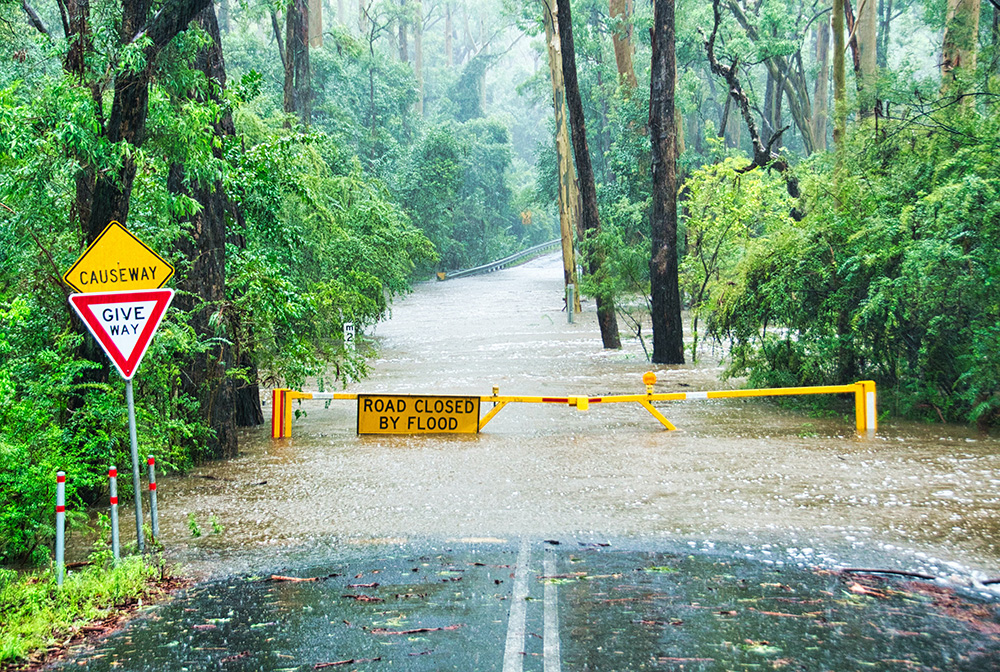
The special session 'Flooding impact to infrastructure networks and bridges: the challenge of scour' will take place virtually on Wednesday 23 June 2021 from 14:00 to 15:30.
The session will be led by Maria Pregnolato and Luke Prendergast.
The programme of this special session will include:
The impact of flooding and scour on infrastructure has severe economic and societal consequences worldwide. Flooding-related losses are projected to increase due to climate change, urbanisation and the increase of urban complexity. Furthermore, estimating the impact and assessing the nature of these events is becoming more uncertain due to these issues. Transport networks not only underpin economic activity by enabling the movement of goods and people, but guarantee emergency operations (e.g. rescue and evacuation) during extreme weather events. Specific assets, such as riverine bridges, are exposed to hydrodynamic effects, aging and the change of demand (e.g. modern cars and trucks), therefore are now at potentially higher risks of failure. This is compounded by the significant portion of infrastructure that is approaching the end of its design lives, putting increasing stress on already limited maintenance budgets. This prompts infrastructure owners and operators, emergency responders, academics, and industrial professionals to collaborate and work together to improve scour assessment of critical infrastructure for current and future scenarios.
This special session aims to bring together experts across the spectrum of infrastructure maintenance management, resilience, and flood modelling fields to assess the state-of-the-art, share knowledge, identify research gaps, and provide suggestion for future research directions in the area of infrastructure resilience to flooding. The session welcomes discussion contributions related to:
- Implication of flooding to infrastructure, bridges and wider transport networks;
- Current risk management practice of bridges in flood-prone areas;
- Impact of scour, debris and hydrodynamic forces on bridges;
- Structural Health Monitoring for improved management of bridges and infrastructure;
- Sensors, AI and smart sensing for bridges and infrastructure.
- Network-wide approaches to scour resilience
- Emergency management of scour-related collapses
Please use the 'add to Schedule' button on the Special Session Programme, to register your interest in participating in this special session.
For more information visit the Special Session Hub. To access this page, you will need to be registered online. If you haven't done so yet, please Register Now Here.
The special session 'Risk Informed Decision Making for Levees and Flood Defences' will take place virtually on Tuesday 22 June 2021 from 13:30 to 15:00.
The programme of this special session will include:
13:30 Introductions
Participants to enter in chat function their name, organisation, country, topics of interest. Please use the 'add to Schedule' button on the Special Session Programme, to register your interest in participating in this special session.
13:35 General introduction on risk framework for levees and flood defences (Rémy Tourment)
Quick presentation of ICOLD TC and EUCOLD LFD WG
a. Definition of risk:
- Components and definition of risk
- Difference between "natural" flood risk and flood risk in the presence of levees
b. Key terms:
Risk assessment, risk management, risk communication, residual risk
13:50 Combining deterministic and probabilistic approaches to make decisions (Dr Jonathan Simm)
a. Risk approaches and probabilistic methods
- Deterministic and probabilistic design of levees – links to and differences from risk-informed design.
- Good practice in flood risk analysis of leveed systems – can deterministic information be incorporated?
b. Consideration of uncertainty
- Uncertainty in loadings on levees.
- Uncertainty in defence performance - fragility curves and uncertainty.
- Uncertainty in consequence attributable to levee segments/systems.
14:05 Discussion on use of risk and probabilistic tools
14:25 Decision making for flood risk management and for levee systems management (Elena Sossenkina and Dr Mike Sharp)
a. What is decided?
- Use of risk to inform decisions regarding flood risk management
- community emergency preparedness activities
- zoning and land development
- flood insurance
- Use of risk to inform decisions regarding levee system management
- type and frequency of inspections
- operation and maintenance activities
- options for improvements
- Use of risk to inform decisions related to both
- Desired level of flood risk reduction (e.g. levee height)
b. Who decides?
- Identify the roles and responsibilities
- regarding asset (levee infrastructure) management
- regarding emergency management
- regarding land use
14:40 Discussion on decision making for levee systems management
15:00 Close of session
For more information visit the Special Session Hub. To access this page, you will need to be registered online. If you haven't done so yet, please Register Now Here.

As sponsors and exhibitors to previous FLOODrisk conferences, in Oxford, Rotterdam and Lyon, we are contacting you to invite you to once again support the 2020 edition of the conference that will take place virtually from 22nd to 24th June 2021.
FLOODrisk2020 will focus on science and practice for an uncertain future. The conference will relate to the Sustainable Development Goals (SDGs) recently adopted by the UN (2016) and to the Sendai agreement on Disaster Risk Reduction (DRR) and, habitually for all FLOODrisk conferences, we are committed to the EU-Directive on Flood Risk Assessment and Management.
But above all this edition of the conference is committed to attract, coach and listen to the next generation of scientists and practitioners who will future-proof our research methods and help to improve our flood risk management practice in order to better cope with deep uncertainty.
We are looking specifically for support from the following organisations:
- providers of new technologies for monitoring and exploiting big and real-time data
- developers of new methods for risk analysis and decision support
- specialists of practical guidance for building resilience or gradual adaptation into the future
- experts in the management of transition of flood risk management policies
As the conference takes place virtually, we are expecting visitors from even more varied countries (30 different countries in the past).
There are number of packages available to support the conference (see https://floodrisk2020.net/how-to-become-a-sponsor-or-exhibitor/) or we are happy to discuss a specific idea that you may have to help us make this conference a success.
You can view the virtual exhibition hall already in motion right now on https://hub.floodrisk2020.net/exhibition/.
You will see from this page, that we have programmed video presentations from our sponsors and exhibitors during the live opening plenary session and during each of the lunch breaks. This would be a great opportunity for you to present your work to FLOODrisk2020 delegates.
We have already opened the virtual networking facility for registered participants.
Once you have registered to attend the conference here, you will be able to view, contact and arrange meetings with other delegates on the networking page of the FLOODrisk2020 Gateway.
This facility is already available now for all registered participants, so please don't forget to register to attend the virtual conference now.

This is a quick reminder for all authors who have had an abstract accepted either for oral or poster presentations that you are required to prepare and submit a video or audio presentation no later than 1st June 2021 and this whether you have chosen to submit a paper or not.
All authors accepted for oral presentations must prepare a video or audio presentation of 10 to 12 minutes, with poster authors required to prepare a video or audio presentation of 3 to 5 minutes. We would also kindly ask you to supply a PDF version of your presentation and poster.
You can find instructions on how to record a video or audio presentation and upload it to the web gateway in this video. If you need a background for your video, you can download the FLOODrisk2020 virtual conference background here.
For those of you currently preparing video presentations for your papers and/or posters who would like to use a specific FLOODrisk2020 background, we have prepared such an image.
You can download here, a background image to use in your Zoom or Teams video recordings if you so wish. There are no obligations to use this background, you may prefer to use your own company background.
Don't forget that you will need to register here to access all the conference sessions and networking functionalities.
We are looking forward to welcoming all delegates and presenters virtually from 22nd to 24th June 2021. We will publish further instructions on how the conference will take place in due course. In the meantime, we have prepared specific instructions for all presenters, papers and posters, for preparation and upload of your video or audio presentations.
Instructions for paper presenters:
All authors are required to upload a 10 to 12 minutes video or audio presentation and PDF version of their presentation no later than 1st June 2021, i.e. 3 weeks prior to the conference opening date. Access to the pre-recorded presentations will be opened for all delegates on 8 June 2021. This should ensure that delegates have ample time to view presentations and submit their questions ahead of the live question and answer and discussion sessions. Access to videos/audios will remain open throughout the duration of the conference and after the conference.
All speakers must be present for the live Question and Answer sessions featuring their presentation. A full programme of these can be found on the programme page. Please ensure that you are available at least 15 minutes prior to the start of the live Q&A session. Links to those sessions will be provided in due course. Note that all live sessions will take place via Zoom and will be recorded. You will be able to add the timeslots for the Q&A sessions that you wish to or have to participate in to a personalised calendar to build your own personal conference timetable.
You can find instructions on how to record a video or audio presentation and upload it to the web gateway in this video.
Instructions for poster presenters:
Poster presentations have been added to parallel sessions. This is a great opportunity for poster authors to present their work in high profile sessions. All poster presenters are required to upload a 3 to 5 minutes video or audio presentation and PDF version of their poster no later than 1st June 2021, i.e. 3 weeks prior to the conference opening date. Access to the pre-recorded presentations will be opened for all delegates on 8 June 2021. This should ensure that delegates have ample time to view presentations and submit their questions ahead of the live question and answer and discussion sessions. Access to videos/audios will remain open throughout the duration of the conference and after the conference.
All poster presenters must be present for the live Question and Answer sessions featuring their presentation. A full programme of these can be found on the programme page. Please ensure that you are available at least 15 minutes prior to the start of the live Q&A session. Links to those sessions will be provided in due course. Note that all live sessions will take place via Zoom and will be recorded. You will be able to add the timeslots for the Q&A sessions that you wish to or have to participate in to a personalised calendar to build your own personal conference timetable.
You can find instructions on how to record a video or audio presentation and upload it to the web gateway in this video.
Instructions for all:
Don't forget that you will need to register here to access all the conference sessions and networking functionalities.
Now that the programme has been published, we wanted to remind you tat you will need to register online here to gain access to the conference virtual hub, all the presentations, exhibition hall and live sessions.
We also have made a few modifications to the programme so please check it up to make note of those changes.
We have also published a set of instructions on how to participate for delegates, authors, poster authors and exhibitors.
Don't hesitate to contact us if you have any question not covered in these instructions.
We are pleased to announce the publication of the detailed programme for the FLOODrisk2020 virtual conference. You can find the programme on page hub.floodrisk2020.net/programme/ of the website.
Parallel Sessions:
You will have noticed that each session, whether plenary or parallel, includes the list of papers followed by a timeslot of 30 minutes for live Question and Answer sessions. All papers, with the exception of those that will be presented in the opening and closing ceremonies, will be pre-recorded and available to view in video or audio format and in PDF format from the 8th June 2021. There is also sufficient time allocated in the programme for participants to visualise all presentations before each Q&A session.
We have staggered the Question and Answer sessions so as to allow delegates to participate in as many live Q&A sessions as possible. You will be able to add the timeslots for the Q&A sessions that you wish to participate in to a personalised calendar to build your own personal conference timetable.
Poster sessions have also been added to the relevant parallel sessions. Each paper video/audio presentations will last between 10 to 12 minutes with poster presentations lasting 3 to 5 minutes. All authors, both paper and poster presenters, will then participate in the live Question and Answer session that will be chaired and co-chaired by members of the scientific and organising committee (to be announced shortly).
Participants will be asked to submit questions in advance if possible, but there will also be opportunities for participants to ask questions during the live Q&A sessions.
Plenary Sessions:
The opening ceremony will take place virtually and live on Tuesday 22 June 2021 from 9:30 to 10:00 CET. It will be followed by live presentations by our sponsors.
The second and third plenary sessions will include pre-recorded video/audio presentations and a 30-minute Question and Answer session.
The closing ceremony will take place live on Thursday 24 June 2021 from 16:00 to 17:30 CET.
Exhibitor Sessions:
In addition to the presentations by Sponsors that will follow the live opening ceremony, there will also be a Session on Tuesday, Wednesday and Thursday between 12:30 and 13:30 CET for Exhibitors to present their organisations and projects.
Special Sessions:
There are also 11 Special Sessions taking place throughout the 3 days of the virtual conference. Special sessions are set up to address a particular challenge in flood risk management through a more interactive format – often through a workshop style more than a presentation approach. The nature of a special session is such that a communicable outcome is aimed for. The topics and leads are indicated in the program. More information on the content and organisation of each of these special sessions will be published shortly.
Please contact us on info@floodrisk2020.net. We look forward to welcoming you virtually on the Conference Gateway on hub.floodrisk2020.net.
The virtual exhibition will provide partners, sponsors and exhibitors with an opportunity to publish posters, brochures, video presentations and access to live chat with delegates before, during and after the conference.
A programme of pre-recorded presentations and live question and answer sessions will also be organised for all exhibitors to encourage discussions with delegates. Gold and silver sponsors will also be offered the opportunity to present their organisation during the live opening ceremony that will take place on the first morning of the conference.
You can view the virtual exhibition hall on page: https://hub.floodrisk2020.net/exhibition/, (click on the company nametag, once it is front-facing, to view their full exhibition booth) and a full description of the benefits of sponsoring and exhibiting at FLOODrisk2020 on https://floodrisk2020.net/sponsors--exhibitors/how-to-become-a-sponsor-or-exhibitor/.
We would like to take this opportunity to thank our authors for submitting their papers and invite you all now to register to attend the conference online.
As announced earlier, the conference will take place entirely virtually and we are pleased to be able to launch the first version of this new virtual gateway on hub.floodrisk2020.net.
From there, those of you who have already registered will be able to access all virtual rooms, organised by themes with the addition of the special sessions, the virtual exhibition hall, the virtual poster hall and the virtual registration desk.
Please feel free to visit the website at will.
Those of you who have not yet registered will still be able to visit the exhibition hall and gateway homepage, which will give a flavour of what you can expect from the rest of the website.
From 7th June 2021, all delegates will be able to access video or audio presentations of all the papers, posters and exhibitors, submit questions and plan attendance of the live Question and Answer sessions. You will also be able to contact other delegates, arrange meetings or submit ideas for networking or pitching sessions to be advertised within the website.
If you are an author, you will be asked to provide, not only the PDF of your paper presentation but also a video or audio presentation. We would ask you to supply this to us, no later than 31st May 2021. You can find instructions on how to do so in the video on https://youtu.be/kXtwFZ4wV88.
Finally, you will see from the virtual conference gateway that the programme has not yet been finalised. We expect to be able to publish the virtual conference programme by the end of February 2021.
Features will continue to be added to the conference gateway so as to ensure that the FLOODrisk virtual conference is a highly interactive successful event that remains enjoyable and productive for all.
If you have any question, please don’t hesitate to contact us on info@floodrisk2020.net.

Re-opening registration
As per our communication of December 2020, the FLOODrisk2020 conference will now take place from 21st to 25th June 2021 online. We have now updated the conference website on www.floodrisk2020.net with additional information on revised fees, new key dates and the organisation and format of this online conference.
Web-based gateway
The online conference will centre around a web-based gateway that will give delegates access to virtual rooms where they will be able to view video or audio presentations of the papers and posters, submit questions and attend live question and answer sessions with oral presentation authors.
Virtual exhibition
Access will also be granted to a virtual exhibition hall where partners, sponsors and exhibitors will be able to publish posters, brochures, video presentation and access live chat with delegates from two weeks prior to the conference, throughout the conference and after the conference. A programme of pre-recorded presentations and live question and answer sessions will also be organised for all exhibitors to encourage discussions with delegates.
Enabling virtual meetings and interaction
The web gateway will also include a networking area enabling delegates to contact their peers via a messaging service. Delegates would also be able to pitch ideas, prior to the event and invite delegates to attend live pitching sessions online during the conference.
Instructions to authors
All authors will be required to upload a video or audio presentation of their paper or poster no later than 2 weeks prior to the conference opening date when access to all presentations will be opened for all delegates. This should ensure that delegates have ample time to view presentations and submit their questions ahead of the live question and answer and discussion sessions, a programme of which will be published in due course. Access to videos/audios will remain open throughout the duration of the conference and after the conference.
We will provide help for all presenters on how to record a video or audio presentation and upload it to the web gateway.
We will strive to make the process of participating in this virtual conference as easy as possible, as enjoyable as possible and as rewarding as possible for all involved. To this end, we have decided to extend the deadline for paper submission by one month to the 11th February 2021, when the video/audio presentation system will also be opened. Please note that the registration to attend the virtual conference is now open on page www.floodrisk2020.net/registration/.
Please see page www.floodrisk2020.net/covid-19-announcement/ for more information, in particular new key dates and Frequently Asked Questions.

After much deliberation and following the latest international situation with regards to COVID19, we have the pleasure to announce that we will be conducting the FLOODrisk2020 European Conference on Flood Risk Management from 21st to 25th June 2021 entirely virtually.
We have therefore decided to postpone the Budapest conference to sometime in 2024, specific dates for this conference will be announced in due time.
We hope to be able to welcome you online for the FLOODrisk2020 conference that will take place from 21st to 25th June 2021. Detailed information on the programme for this virtual conference and how to gain access and participate in the conference will be published in the new year.
For those of you who have already registered and paid to attend the conference, please note that you will receive a credit note for the registration fee as well as a new invoice for registration to attend the online event in January once the new pricing structure has been established.
In the meantime, we would like to wish you and your family a healthy and prosperous new year for 2021.
Best regards,
The FLOODrisk2020 Local Organising Committee
Programme
Note: all times are in Central European Summer Time
Tuesday 22 June 2021
-
9.30 - 9.40:Prof. Józsa János, Rektor - BME
-
9.40 - 9.50: The FLOODrisk conference series – the journey so farDr. Jonathan Simm - HRW
-
9.50 - 10.00: How to get the best out of the FLOODrisk 2020 conferenceMrs. Estelle Morris - Samui
-
11.00 - 11.20: Development of flood risk in the past and in the futureGuenter Bloeschl - TU Wien and EGU chair of
-
11.20 - 11.40: Measuring community flood resilience across the globeReinhard Mechler and Adriana Keating - IIASA
-
11.40 - 12.00: Supporting flood risk management in Europe - overview and recent developmentsPeter Salamon - JRC
Vice-Chair: Matthijs Kok
- 13_1: An assessment of best practices of extreme weather insurance and directions for a more resilient society- Dr. Paul Hudson
- 11_15: The benefits of conserving foreshore vegetation- Timothy Tiggeloven
- 13_26: International Guidelines on Natural and Nature-Based Features- Dr Todd Bridges
- Poster: 13_10: Sponge cities and sustainable drainage systems: sharing best practice in China and the UK- Ms. Lisa Stewart
- Poster: 12_16: Impact of river interventions on flood water levels near river bifurcations- Matthijs Gensen
Led by: Rémy Tourment and Elena Sossenkina
The session will commence with the following presentations:
- General introduction on risk framework for levees and flood defences - Rémy Tourment
- Combining deterministic and probabilistic approaches to make decisions - Dr Jonathan Simm
- Decision making for flood risk management and for levee systems management - Elena Sossenkina and Dr Mike Sharp
This will be followed by questions and answers and open discussion stimulated by the presentations
Led by Laszlo Balatonyi and Gheorghe Constantin
The Preparedness and response activities in the Danube Region session aims at introducing the EU Strategy for the Danube Region (EUSDR) Environmental Risks Priority Area (PA5) and its Disaster Management Working Group (DM-WG). The focus will be tailored to preparedness and response activities, with special focus on Tailings Management and related initiatives of the International Commission for the Protection of the Danube River (ICPDR) Accidental Pollution Control Expert Group (APC EG). The session will be concluded by sharing the latest information about possible funding instruments to achieve better preparedness and more effective response in the region.
- Introduction: of the EU Strategy for the Danube Region, Environmental Risks Priority Area (05) Dr. László Balatonyi / Gheorghe Constantin
- Challenges in the Danube Region –
- Strategic partnership in the Danube Region: EUSDR PA5 – Dr. László Balatonyi
- Preparedness and response:
- Remote sensing, as one of the potential technologies (Dr. Tibor Bíró, NUPS)
- Case study of a tailing management facility disaster - consequences and overall effect on the Hungarian disaster response system (Kolontár, HU) tbc
- The EUSDR PA5 Disaster Management Working Group – Zsolt Kelemen
- Ongoing projects and funds related to Preparedness and response activities – Kinga Perge
- Activities of ICPDR APC EG
- Tailing Management in the Danube Region – Ádám Kovács
Vice-Chair: Péter Torma
- 1_23: How climate change induced storm clusters affect water levels along the Dutch coast- Prof.dr Suzanne Hulscher
- 1_25: Influence of water depth on wave overtopping- Menno de Ridder
- 1_117: Assessing flood levels in shallow lakes- Dr. Tamas Kramer
- 1_119: Storm Surge Contributions to Flood Hazards on Canada's Atlantic Coast- Mitchel Provan
- Poster: 1_21: Effect of storm climate trends and uncertainties on Dutch levee design- dr Jacco Groeneweg
- Poster: 9_24: On the choice of storms for flood risk and safety assessment- Dr. Sofia Caires
- Poster: 11_13: Effect of sea level rise on the overtopping of English coastal defences- Dr Dominic Hames
Vice-Chair: Gergely T. Török
- 22_4: Control over one’s environment? Leveling political capabilities to advance procedural justice in Flood Risk Management- Lieke Brackel
- Poster: 7_10: Coping and adaptation to coastal erosion and flooding and the role of local social capital. The cases of Keta and Ada along the Southeastern coast of Ghana.- Mr Sule Ayannor Issaka
- Poster: 9_31: Evaluation of vehicle instability risk in fords - Ricardo A. Bocanegra
Vice-Chair: Mr. Mark Morris
- 7_5: Sentinel data for flood disaster monitoring and assessment: case studies in Romania- Dr Gheorghe Stancalie
- 7_8: On the implementation of the French methodology for flood damage assessment to economic activities.- Miss Marta Galliani
- 2_28: Impact of climate change on Hungarian Water Management Strategy- Dr Laszlo Balatonyi
- Poster: 7_1: Assessment of Agricultural Damage under Different Simulated Flood Conditions- Mr Md Nurul Kadir
- Poster: 10_2: Understanding human behaviour dynamics for better prediction of flash flood social impacts: Insights from post-flood surveys analysis- Mr Javed Ali
- Poster: 24_3: Flood Damage Assessment in Support of the Definition of Risk Mitigation Strategies: The Case of Lodi- PhD Daniela Molinari
- Poster: 9_6: Flood Impacts across Scales: towards an integrated multi-scale approach for Malaysia- Dr Vicky Bell
- 10_4: A comparison of preferences in flood risk communication from the perspective of Dutch and English residents- Karin Snel
- 16_5: Creative participatory river ‘daylighting’: working with children as hydrocitizens in visioning future adaptations to local flood risk- Prof. Lindsey McEwen
Vice-Chair: Timothy Tiggeloven
- 12_8: Effectiveness of flood retention basins under hydrologic uncertainty- Joost Pol MSc
- 9_19: Accounting for peak attenuation in flood risk management in the River Meuse, the Netherlands- Nathalie Asselman
- 21_4: Towards a research agenda for sustainable sediment management in the Rhine River Basin- Dr. Ralph Schielen
- 13_25: Innovative tools for improving flood risk reduction strategies: the FLORIS project- Prof. Giuseppe T Aronica
- Poster: 18_5: Adapting to the impacts of pluvial flooding: Results of a household survey in three German municipalities- Lisa Dillenardt
- Poster: 12_24: Odra River Basin Flood Protection Project - implementation of the flood risk management plan- Rémy Tourment
Vice-Chair: Heather Murdock
- 19_6: Quantitative assessment of evacuation measures in flood-prone areas- dr.ir, Bas Kolen
- 18_6: Emergency Flood Control – Large-Scale Testing and Cost Analyses of Sandbag Schemes and Alternative Mobile Protection Systems- Prof. Baerbel Koppe
- 17_15: Web and App-based management of flood emergency plans at local entities level- Mr Javier Loizu
- Poster: 19_3: BresDefender: A potential emergency measure to prevent or postpone a dike breach.- D. Janssen
- Poster: 18_2: Risk-based decision-making in case of a threat for flooding- dr.ir, Bas Kolen
- Poster: 18_3: Regional guide lines for flood risk assessment and emergency response: participatory approach and IT tools for risk management.- Engineer, PhD Tiziana Bisantino
Vice-Chair: Lisa Stewart
- 11_5: Bayesian multilevel modelling to improve the transferability of residential flood losses model- MSc Guilherme Samprogna Mohor
- 19_4: The effect of improved mortality functions and evacuation insights on loss-of-Life risk assessments- Dr Karin de Bruijn
- 11_9: A new model for consideration of flow velocity in flood damage and loss prognosis- Dr.-Ing. Holger Maiwald
- Poster: 4_7: Resilience Index of Flood Prone Communities in Ibadan, Nigeria- Dr Felix Olorunfemi
- Poster: 11_21: Practical indicators for road infrastructure resilience to flood risks in France, case study of Nantes Ring Road network- Zhuyu Yang
Vice-Chair: Wouter Jan Klerk
- 1_20: The Vulnerability of Damaged River and Lake Dikes for Wave Overtopping- Vera van Bergeijk
- 1_22: The failure probability of grass erosion due to wave overtopping. A case study of the Afsluitdijk, The Netherlands- Dr. Jord Warmink
- 17_13: An Overview of Current Knowledge and Challenges in Predicting Breach Through Dams and Levees- Dr. Mark Morris
- 3_11: Advances in Levee Reliability Assessment Using Transient Seepage and Slope Stability Models to Simulate Levee Performance during Storm Events- Dr. Martin Schultz
- Poster: 17_14: Industry Research into Dam and Levee Breach Erosion Through Coarser Grained Materials- Dr. Mark Morris
Led by: Adrian Schmid-Breton and Jan Kruijshoop, International Commission for the Protection of the Rhine (ICPR)
What are the water management challenges facing (international) river basins and what can they do to meet them? What can (international) river basins do to prepare and adapt to future changes?
Organised and moderated by the International Commission for the Protection of the Rhine, the oldest international environmental river commission in the world, and accompanied by other river basin organisations from all over Europe this session address the issue of preparing (international) river basins for the effects of socio-economic and climatic changes, with consequences on discharge (floods, low water & droughts), the use of the water and water availability. To answer these challenges a strong cooperation within river basins is fundamental. Collaboration between river basins themselves could be also highly beneficial. The session goes beyond solely managing flood risks.
After an introductory presentation by the ICPR on the new integrated Rhine 2040 programme and the work related to CC and (quantitative) water resources management, the participating basin organisations and international institutions will share their experiences on future challenges and ongoing programmes/projects in the form of a round table discussion and Q&A. Possibilities for further (international) interbasin exchange and cooperation will be explored.
In addition, the public will have the opportunity to ask questions to the various organisations present and to participate in the debates. Questions submitted beforehand by the public will be addressed within the session. Additionally questions from the audience can be asked via chat during the session.
Wednesday 23 June 2021
-
9.00 - 9.20: Modelling chain and results of generating Future Weather, rainfall-discharge modelling, river routing and the derivation of future river discharge regimes in a large catchment (exemplified for the Rhine). Summary of the joint work of a number of (inter)national (mainly German and Dutch) expert scientists and agencies on this as well as sketch a perspective for future research and application.Mark Hegnauer - Deltares
-
9.20 - 9.40: Nature-Based Solutions for Flood Mitigation and the Evaluation of their Co-Benefits: Examples from the Danube River BasinFrancesca Perosa - TU Munchen
-
9.40 - 10.00: Systemic flood risk management planning: accounting for risk-distribution across flood-protected areas and deeply uncertain hydraulic interactions.Alessio Ciullo - ETH Zurich, CH
Vice-Chair: Karin de Bruijn
- 21_1: Evaluating past and future flood risk reduction in the Rhine river basin- Adrian Schmid-Breton, Nikola Schulte-Kellinghaus
- 12_27: An advanced framework of flood risk management: The outline- Prof. Jochen Schanze
- Poster: 8_7: Flood risk management in Hungary- Éva Csengeriné Veczán
- 19_2: Enhancing the resilience of levee systems through methodological developments- Mr. Marc Igigabel
- 24_7: Risk Informed Decisions for Levees- Dr. Michael Sharp
- 14_9: Serious gaming as an innovative means for handling complexity in flood risk reduction- ir Frank den Heijer
- 14_10: Existing levee system economic evaluation methodology- M Edouard DURAND
- Poster: 12_3: The four components to combine flood protection with other functions- Richard J.C. Marijnissen
- Poster: 8_3: Daily and seasonal deformations of a Dutch Levee along a tidal river and during dry and wet conditions.- Dr. Meindert Van
Vice-Chair: Gadadhara de Figueiredo Ferraz
- 17_6: A simple conceptual model for coupled hydrological-hydraulic simulation in large basins with significant flood-propagation effects.- Mrs. Beatriz Tejerina
- 9_16: Spatio-temporal mapping of European floods of record- Prof. Attilio Castellarin
- 3_6: Design flood assessment on the upper Rhine using historical data and accounting for discharge uncertainty- Dr. Michel Lang
- 7_11: Causes of heavy tails in flood peak distributions- Prof. Bruno Merz
- Poster: 9_11: River-dike-floodplain system Interactions and temporal dynamics for large-scale flood risk assessment- Mr Mostafa Farrag
- Poster: 3_5: Climate change allowances, non-stationarity and flood frequency analyses- Adam Griffin
Vice-Chair: Paul Hudson
- 17_3: Flash flood impacts nowcasting within the PICS project (2018-2022): End-users involvement and first results- Pierre Javelle
- 17_12: A tailor-made 1D hydrodynamic modelling solution for flood forecasting on the Danube catchment- Dr Zoltán Liptay, Dr Balázs Gauzer
- 6_6: Cross-border flood warning and forecasting in the Raab river valley- Dr Tamas Kramer
- Poster: 17_1: Toward a user-based fast running method for coastal flooding forecast and early warning- Dr. Deborah IDIER
Vice-Chair: Timothy Tiggeloven
- 6_8: Flood risk assessment in underground transport systems in a context of climate change - A case study of the Barcelona metro system- Mr. Edwar Andres Forero Ortiz
- 3_12: Continuuous assessment of the resilience of critical infrastructure: the Nantes ring road flood experimental scenario- Hélène Dolidon
- 19_12: Investigating the Importance of Critical Infrastructures’ Interdependencies during Recovery; lessons from Irma Hurricane in Saint-Martin’s Island.- Dr. Rita DER SARKISSIAN
- Poster: 6_4: Flood hazard associated with extended linear infrastructures: a simplified methodology to assess and manage it- Alessio Domeneghetti
- Poster: 13_18: Young investigator group on improving the flash flood resilience of critical infrastructures: benefiting from interdisciplinary experience- Dr. Sebastian Golz
- 14_1: Predictive condition-based monitoring for low utilisation motor driven flood risk management infrastructure - Mr. Keith Solts
- 9_3: Detection of seepages and monitoring of structural changes in earthen embankments by FO DTS- Ing. Filip Čejka
- 14_6: Investigation, assessment and remediation of levee transitions- Dr. Jonathan Simm
- 24_8: A method to assess the failure probabilities of river levees based on Elicitation, Calibration, Aggregation, and Debiasing of expert judgement (IeCAD)- Pr Laurent PEYRAS
- Poster: 13_14: Self operating flood barriers: engineering application of hydrostatic principles for civil protection in an uncertain future - Dr Antonis TOUMAZIS
- 24_1: Assessing Climate Resiliency of Flood Risk Management Strategies in Finland - Mr Antti Parjanne
- 25_3: Long term flood risk management: Exploration of options for the Rhine River Delta under sea level rise scenarios- Dr. Karin de Bruijn
- 16_4: Climate Adaptation in Ireland- Dr Wolfram Schlüter
Vice-Chair: Pierre Javelle
- 17_11: Operational river ice and water temperature forecasting on the Hungarian Danube reach- Dr Zoltán Liptay, Dr Balázs Gauzer
- Poster: 17_9: Early warning system for flood forecast: from numerical weather prediction to an interactive web service- Paulo Fernandez
- Poster: 17_20: Transposition of a flash flood forecasting model developed for Mediterranean and Pyrenean catchments to river basins in Luxembourg- Audrey Douinot
Vice-Chair: Gergely T. Török
- 7_6: Post-event Flood Damage Surveys: A New Zealand Experience and Implications for Flood Risk Analysis- Ryan Paulik
- 3_9: Monitoring highly dynamic flood events: The Helmholtz initiative MOSES- Prof. Bruno Merz
- Poster: 2_27: Abnormal rainfall, extreme riverflow and disastrous flood in a tropical state of India- Dr. Shadananan Nair
- Poster: 7_7: Cloudburst Flash Flood Modelling: A case study- Dr. Anil Kumar Lohani
Led by: András Kis and Gábor Ungvári
Contributors: Lenka Slavíková, Nejc Bezak, Thomas Hartmann, Piotr Matczak
The Land4Flood community of scholars and practitioners is based on the shared understanding that the recent demand for flood defense by nature based solutions can only be accomplished if the engineering, legal and economic aspects of planning are considered as a comprehensive implementation process.
The special session will be built on the Land4Flood knowledge-network development, provides insight from this broadening pool of experience for the experts of the flood defense field and raises the awareness about the critical points of interconnections that can thwart successful realization flood risk mitigation.
Led by: Maria Pregnolato and Luke Prendergast
Sessions format:
- Short keynote presentation (Dr Prendergast)
- minute presentations from each attendant
- Discussion over a theme or break-out rooms over multiple themes e.g.
- Scour modelling
- Scour management
- Decision-support
- Prevention/mitigation
- Monitoring
- Sensors/approaches to detect scour
- Visual inspection assessment strategies
- Alternative assessment strategies
- Climate change related scour modelling
- Network resilience
- Combined damage modelling (scour and other damage)
Vice-Chair: Dr. Evalyna Bogdan
- 21_3: Flood Risk Management in the Danube River Basin – Transboundary Cooperation in the frame of the ICPDR- Mr. Clemens Neuhold
- 14_8: Adaptive asset management for flood protection: A perspective from the North-Sea Region- Mr. Paul Sayers
- 5_4: Floating and amphibious houses: A creative use for our valuable flood plains?- Prof. Edmund Penning Rowsell
- 4_5: How does culture affect individual adaptation to climate-driven floods?- Mr. Brayton Noll
- Poster: 10_1: Living with floods and land management strategies in Nepal - Dr. Zuzana Boukalova
- Poster: 25_2: A flood resilience observatory in French Polynesia: results and research perspectives from the ILOTS project- Bastien Bourlier
- Poster: 13_23: Advances in amphibious retrofit construction for flood risk reduction for vulnerable populations- Dr. Elizabeth English
- 4_1: Probabilistic loss modelling supports flood risk assessment under changing conditions- Dr. Heidi Kreibich
- 9_8: Analysis of uncertainty and sensitivity of coastal flood risk- Mr. Ben Gouldby
- 9_20: SENSITIVITY OF PLUVIAL SIMULATION IN THE CONTEXT OF NATIONAL-SCALE FLOOD MODELS- Ladislav Palan
- Poster: 11_2: Application of Big Data Methods in a Comprehensive Multi-Model Chain for the Assessment of Future Fluvial Flood Risk - Verena Maleska
- Poster: 9_5: Index-based flood risk assessment in Denmark: An adjusted approach with focus on vulnerabilities- Ms Kaija Jumppanen Andersen
- Poster: 11_4: Flood risk impact factor considering uncertainty in flood damage estimation- Professor Masaru Morita
- Poster: 9_13: Dike failure, sedimentation and uncertainties: a dynamic view of flood risks in the Koshi River, Nepal- Dr Julien Oliver
Vice-Chair: Bruno Merz
- 11_3: The “Flood Damage Models” repository- Daniela Molinari, PhD
- 4_3: People, not just places: Expanding social vulnerability indices by social-psychological factors- Dr. Sebastian Seebauer
- 12_26: Development of Vulnerability Module for Inland Flood CAT Models in Central European Countries- Raulina Wojtkiewicz
- Poster: 7_3: Discharge-damage curve and EAD estimates in the Pamplona metropolitan area (Spain) by using insurance data- Dr. Luis Mediero
- Poster: 9_15: A comparative analysis of flood damage models: lessons learnt and future challenges- Dr Chiara Arrighi
- Poster: 4_6: Vulnerability assessment in flood-prone areas of Mainland Portugal- Assis. Prof. Paulo Fernandez
- Poster: 11_14: Understanding flood vulnerability of buildings in US: A perspective through claims data- Raulina Wojtkiewicz
- Poster: 4_8: Flood risk vulnerability of Mallorca Island: an economic approach based on the territory values- Dr. Maurici Ruiz
Led by: Harm Rinkel, Stephanie Janssen & Ellen Tromp
Across Europe, the countries need to take measures – part of the EU Water Framework Directive – to protect the hinterland from flooding, such as dike reinforcement projects. At some locations, this appears to be difficult, partially due to the perceived challenges and hurdles around the Natura2000 legislation. Different approaches are followed both within and between countries. It is worth the effort to enhance the learning on these approaches in an attempt to safeguard both the threatened species and habitats as well as the inhabitants from flooding.
Programme:
16:00 Opening and introduction
Setting the scene by David van Raalte director at Waterschap Drents Overijsselse Delta
Interaction with participants
16:20 Case study presentations & Discussions
17:00 Group work – sharing experiences and best practices in combining Flood Risk Management and Natura2000
17:20 Session closure and next steps
Led by: Wout de Vries and Ludolph Wentholt
This special session is an open invitation to join us in a coalition of the willing to arrive at the International Handbook for Emergency Response to Flood Risk. It can also be seen as a stepping stone towards the International Community of Practice of Flood Fighters.
16:00 Introductions - Participants to enter in chat function their name, organisation, country, topics of interest
16.10 Interactive introduction, including topics Why a Handbook, Experience so far, Initial thoughts on the table of contents, Target audience, Expected outcome.
16:35 Practical aspects (interactive): How to arrive at a coalition, Position and future use of the Handbook, Proposed way of working, Roadmap to kickoff, other items to be considered.
17:00 Further discussion
17:30 Closure
Led by: Karin de Bruijn, Jason Needham, Woodrow Fields, and Paul Risher
This special session will survey current methods of flood fatality modeling from around the world. It will also give examples of how policy supports the use of that modeling for flood risk estimates. Presentations will be highlighted by a live demonstration of LifeSim as one example of a consequence model and followed by Q&A with the audience.
Vice-Chair: Heather Murdock
- 9_23: Debris-flow risk assessment to support mitigation design on Cheekeye River, British Columbia, Canada.- Kris Holm
- 7_14: Estimation of extreme flooding based on stochastic weather generators supported by a regional precipitation study and non-systematic flood data- Mr. Carles Beneyto
- 17_22: 2013 Monsoon Floods of Uttarakhand in India: What we have learnt from this event ?- Dr. S.K. Sharma
- Poster: 7_9: Hydrological modelling of Chenab catchment using satellite based rainfall estimates- Biswa Bhattacharya
- Poster: 18_9: Application of HEC-HMS for rainfall-runoff modelling in Mozambique and France- Mr Helder Guta
Thursday 24 June 2021
- 24_2: The use of historic flood events to reduce uncertainty in future flood frequency predictions: a bootstrap method- Dr. Anouk Bomers
- 2_26: Investigating ways to predict channel changes to inform flood risk management now and in the future- Mrs Hayley Bowman
- 3_3: Flash flood risk assessment for the German federal trunk road network - Kerstin Büche
- 7_4: Improving Situational Awareness for Floods: Monitoring Using Satellite Data in the Boreal Region- Juval Cohen
- 17_19: Improved Prediction of Atmospheric Rivers That Drive Flood Damages in the Western United States- Dr. Cary Talbot
- Poster: 10_3: The effect of depth-duration-frequency model recalibration on rainfall return period estimates and perceived flood risk- Lisa Stewart
- 19_1: Communication in crisis management – current status, needs and potential development areas- MRS Karolina Jankowska
- 21_2: DAREnet: A practitioner network to strengthen flood resilience in the Danube River region- Dr Christian J. Illing
- 19_7: International Handbook for Emergency Response to Flood Risk: A call for collaboration - Mr Wout de Vries (on behalf of Mr Bart Vonk)
- 19_8: Post-disaster reorganisation of local and national institutions: the case of St. Martin after hurricane Irma (West Indies)- Dr Gwenael JOUANNIC
Vice-Chair: Danny Janssen
- 8_2: Degradation of grass revetments: a comparison of field observations and structured expert judgement - Wouter Jan Klerk
- 17_21: Geophysical and geotechnical data fusion for protection dikes characterization- Dr Theo Dezert
- 17_10: Internal Erosion Breach Model Review and Validation- Dr. Mark Morris
- Poster: 11_17: A simple spatial variability model applied to dike system assessment of slope stability- Daniël Kentrop
- 9_4: Current and future flood risk in the Danube region using an open loss modelling framework- Kai Schröter
- 9_14: Impacts of climate change on regional flood risk in Queensland, Australia.- Ms Amanda Cheong
- 25_5: Next generation exploration of UK future flood risks: High resolution climate, population and adaptation futures- Paul Sayers
- Poster: 12_13: An assessment of future flood risk in the Awash Basin, Ethiopia to the 2050s- Mr. Paul Sayers
- Poster: 19_11: Review of state-of-the-art computational software for quantifying flood risk in coastal cities- Yuyang Shao, Yifan Zhang, S. Thomas Ng
- Poster: 12_25: Large-scale flood risk assessment and management: prospects of a systems approach- Kai Schröter
- Poster: 9_33: When physical vulnerability meets hazard: A simplified approach to assess flood risk in Historic Urban Areas- Tiago Miguel Ferreira
- 9_1: Assessing direct flood damages using open data in diverse urban environments- Dr. Dominik Paprotny
- 9_22: Acknowledging residual risk behind dikes: Examples from the USA, Quebec (Canada) and France- Dr. Anna Serra-Llobet
- Poster: 9_2: Considering 3D-objects within a 2D hydraulic modelling approach of pluvial flooding events- Dr. Matthias Stork
- Poster: 13_3: Pilot project EroL: Erosion events caused by heavy rainfall in Markgräflerland- Recommended actions for affected communities- Jessica Kempf
- Poster: 9_10: Pluvial flood risk assessment for the downtown area of Shanghai- Dr. Qian Ke
- Poster: 9_18: National Flood Mapping - Indicative fluvial flood map for Ireland- Mr Conor Galvin
Vice-Chair: Koen van Hattum
- 12_2: Tailored Flood Risk Management: how to design a site- and culture-specific strategy?- prof. dr Frans Klijn
- 12_12: How can we plan resilient systems of nature-based mitigation measures in larger catchments for flood risk reduction now and in the future? - Dr Barry Hankin
- 23_2: Modifying flood risk management in England to meet the needs of a changing future - Emily Clarke and Alisha Burke
- 3_7: Operating and optimising multifunctional urban flood protection - Lake Phoenix Dortmund- Alexander Hartung
- Poster: 14_13: How about the dikes? Managed realignment in progress at the Hedwige-Prosperpolder- Kim van den Hoven
- Poster: 12_29: Integrated Catchment Based Solutions- Ms Stephanie Dufour
- Poster: 12_30: The potential of reservoirs for both flood control and irrigation in the Sebou River (Morocco)- Mrs Benchbani Ikram
- 24_5: Examining the practical use of Dynamic Adaptive Policy Pathways in Danish Municipalities- Miss Mie Thomsen
- 13_11: Building Back Better Critical Infrastructures in a flooding context: Proposal of an operational approach - Mr. Anas DABAJ
- 12_20: Coping with flood risk adaptation in Mediterranean countries: evidences, uncertainties, strategies and limits- Prof Maria Carmen Llasat
- 13_29: Flood Adaptability Assessment in Low-lying Cities for Coping with Climate Change- Dr Yuto Shiozaki
- Poster: 1_1: Climate-Proof through Flood-Proof: Learning Better Defence in the ‘Living Lab’ of the Hedwige and Prosper Polder- Ludolph Wentholt
- 13_7: Assessing resilience to floods in an holistic perspective in French Polynesia- Bastien Bourlier
- 13_12: A Resilient Leadership for Resilient Cities- Mr Cheick Fousseni DIABY
- 25_6: Adaptation pathways and path dependencies: Insights into past and future decision-making in flood risk management- Dr. Sebastian Seebauer
- Poster: 6_7: Innovation to elevator maintenance for flood-prone buildings utilizing information and communication technology- Ms Jiduo Xing
- Poster: 12_28: A Cost Efficiency Analysis of Flood Proofing Measures for Hydraulic Risk Mitigation in an Urbanized Riverine Area- Ugo Ventimiglia
- Poster: 13_28: Concept of Grand Design for a Flood-Adaptable City – Toward Smart Urban Design with Both Familiarity to Water and Flood Hazard- Prof Takaaki Kato
Vice-Chair: James Miller
- 19_5: Towards a power outage driven response curve for modelling households evacuation decision-making: An empirical study of 2016 and 2018 floods in the Ile-de-France Region (France)- Dr Abla Mimi Edjossan-Sossou
- 19_9: A qualitative study of the impacts of flooding on the health and wellbeing of professional responders- Dr. Sally Priest
- 18_4: HEIMDALL: a technological solution for floods and multi-hazard management support- Stephanie Battiston
- 3_8: Data integration for rapid flood mapping and impact assessment - Kai Schröter
- 9_9: Pluvial flooding: hazard mapping and derivation of impact indicators- Dr.-Ing. habil. Regine Ortlepp
- 9_21: Comprehensive flood risk analysis at your fingertip through cloud-computing and standardized approach- Mr. Matthijs Bos
- Poster: 19_10: Review of state-of-the-art computational software for quantifying flood risk in coastal cities- Miss Yifan Zhang
- Poster: 11_12: Developing multivariable probabilistic flood loss models for companies- Lukas Schoppa
- Poster: 17_18: Forecasting river flood extent operationally using real-time 2D modelling- Dr. Tamas Kramer
- 12_19: New style flood risk management with faster hydrological models. From a practitioners perspective.- M.Sc. Joost van der Hammen
- 16_7: Enhancing flood risk governance and resilience with a serious role-playing game as an educational and engagement tool- Ms Heather Murdock & Dr. Evalyna Bogdan
Led by: Jonathan Simm, Jaap Flikweert, Matt Arthur
Transitions between levees (earthen flood embankments) and other hard structures are areas of weakness within an overall system of flood defences and can be found at any location, on or within a flood defence where there is a change in flood defence structure or of protection revetment (slope or crest, road, etc.), in an internal cross section and in the construction or foundation materials. The transition typically promotes the processes of internal and external erosion. If these processes are undetected, or left unchecked, they can ultimately lead to flood defence failure and breach. This special session outlines the results of UK research on the inspection, performance assessment and management of transitions. There will be plenty of time for discussion to explore experiences of attendees related to transitions, to compare different approaches in Europe and elsewhere to their assessment and management and to identify future research needs.
- 5_1: Improving urban flood estimation and flood risk assessment using landscape metrics - Dr. James Miller
- 14_4: Identification of River Defences from Digital Terrain Models using Deep Learning- Dr David Wood
- Poster: 3_1: Uncertainty estimate of flood hazard for an extreme flood- Mr André Paquier
- Poster: 11_19: Interdisciplinary approach to flood risk and the Consequence of Flooding- Eva Suarez
- Poster: 9_32: Development of flood mapping techniques and their efforts on flood assessment and management in European coastal cities- Zhuyu Yang and Maria Fabrizia Clemente
Vice-Chair: Joost van der Hammen
- 8_1: Managing drought effects on levees in England and The Netherlands- Dr. Marcel BOTTEMA
- 14_11: The new French regulation on flood protection works: consequences on risk management- M. Rémy Tourment
- 13_27: Sustainable Dredged Sediment Mangement to Support Storm Risk Management - Dr Joseph Gailani
- Poster: 11_11: DataBeach: Machine learning and probabilistic methods for soft coastal protection design and maintenance- Dr Aline Pieterse
- Poster: 12_23: Upcycling of local soil for sustainable levees in the Netherlands- Msc Carolin Briele
Led by: Dr Clare Twigger-Ross, Dr Simon McCarthy, Dr Jonathan Simm, Paula Orr and Rolands Sadauskis
There is much discussion around the involvement citizens and communities in the delivery of flood resilience. This interactive session draws on recent review work from England looking at the role of citizens and communities in flood and coastal erosion risk management activities, specifically in terms of managing uncertainty and future risks through adaptation and transformation (proactive resilience) to examine what the future of communities’ and citizen’s involvement might look like, the challenges and opportunities. The session will consist of:
- Current and possible futures for communities and citizens (Dr. Clare Twigger-Ross, CEP)
- Discussion in small groups: futures, challenges, opportunities (All)
- Challenge Panel and discussion on Communities’ and citizens’ involvement challenges and Opportunities – Where next? – Key experts from different perspectives in FCERM including Prof Lindsay McEwen
- Round up and final points
Led by: Karin de Bruijn, Heather Murdock, Shristi Vadya and Dr. Evalyna Bogdan
Urban areas are very vulnerable to floods and risk management in such areas is complex. In the event of a flood people and businesses in the urban environment often depend on the ability of the city and higher levels of government to cope. There are, however, many actors that need to be involved including not only water specialists and emergency managers but also urban planners, critical infrastructure operators, and the local community as a whole. This session will explore how damage and disruption can be reduced in a workshop format with consideration of the role of critical infrastructure and network effects using the Circle tool. This will include:
- Presentation on urban flood resilience (Dr. Karin de Bruijn)
- Workshop session using the CIrcle tool (Heather Murdock & Shristi Vadya)
- Debrief session (Dr. Evalyna Bogdan)
We invite anyone interested in enhancing urban flood resilience to join this participatory session.
Vice-Chair: Anna Serra-Llobet
- 12_6: Cost-Benefit Analysis and Feasibility Studies for Prioritization of Structural Measures in main river systems of Spain- Mrs Elena Martínez Bravo
- 13_8: Mapping resilience-building attempts to explore intra-floods reorganisation processes: Insights from recurrent flooding of the Seveso River (Milan, Italy)- Irene Bianchi
- 11_20: Shifting from asset damage to well-being loss within flood risk management- Koen van Hattum MSc
- Poster: 14_3: Flood risk assessment of the City of Calgary considering flood control barrier performance- Florence Mainguenaud
- Poster: 24_9: Keadby Terminal Assisted Outfall Pumping Station – Lessons learnt and a Blueprint for Strategic Asset Management in the Future- Mr Andrew Fenna
Vice-Chair: Kerstin Büche
- 6_2: Development of a flood damage model for urban drainage networks- Daniela Molinari, PhD
- 2_25: Flooding impact on bridges and roads: from asset- to network-level - Maria Pregnolato
- 6_3: Flood impact on critical linear infrastructures- Dr Chiara Arrighi
- Poster: 7_12: Fragility Assessment of Highway Bridges Subject to Flood-Induced Loads and Scour- Zuleyha Kanpara Civas
- Poster: 18_8: Examining the Operational Aspect of Pedestrian Evacuation Modelling; A case study of Ras-Baalbek flash floods–Lebanon.- Dr. Rita DER SARKISSIAN
-
16.00 - 16.10: Ready and resilient? The future of flood and coastal risk management in EnglandCaroline Douglass - UK Environment Agency
-
16.10 - 16.20: EU Floods Directive: Future Challenges for science and practiceClemens Neuhold - Federal Ministry of Agriculture, Regions and Tourism, Austria
-
16.20 - 16.30: From Convention to Action: Managing a Shared Basin - past and futureIvan Zavadsky - ICPDR
-
16:30 - 16:35: Awards best poster/ best paper / best presentationFrans Klijn - Deltares
-
16.35 - 16.45: Why Budapest – setting the scene in Hungary from a scientific point of viewTamás Kramer - BME
-
1645 - 17:00: Evaluation of the conference, thanks and closingFrans Klijn - Deltares

